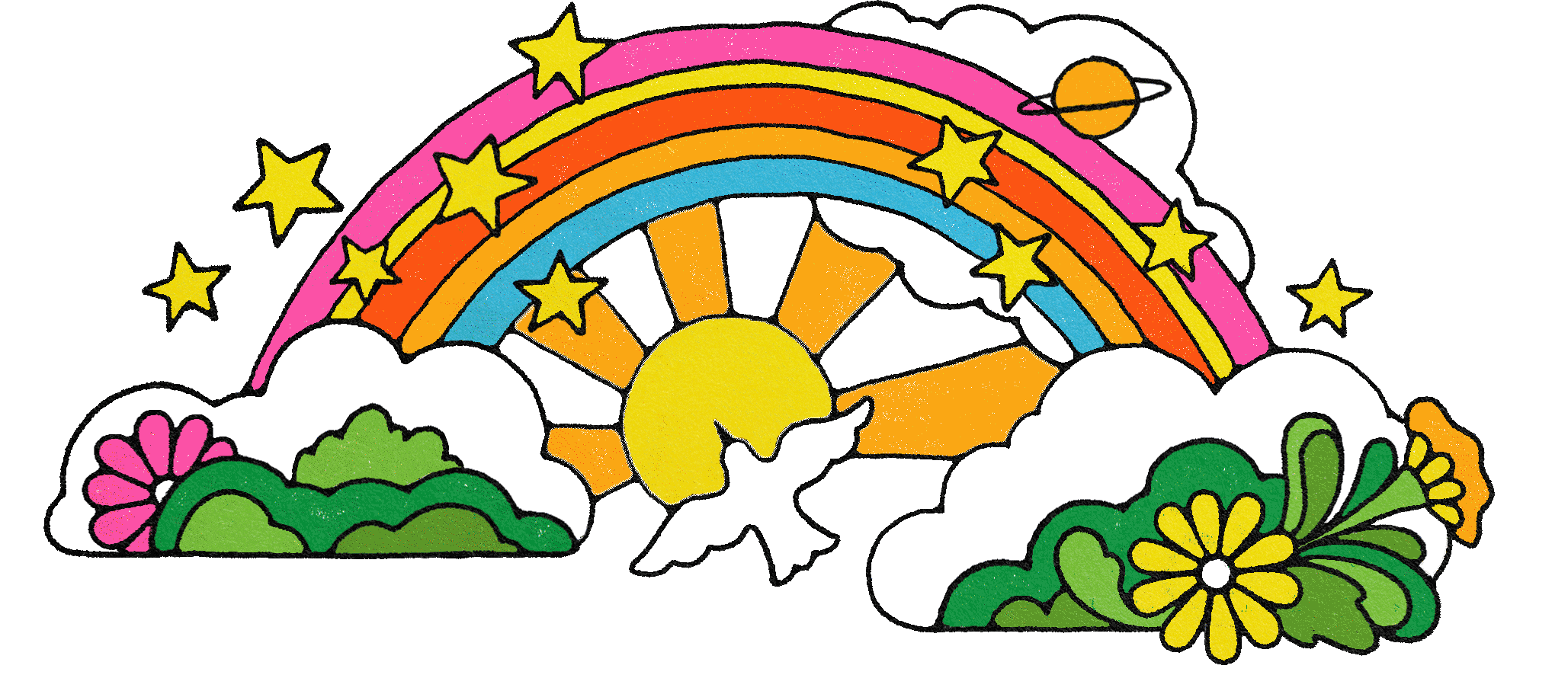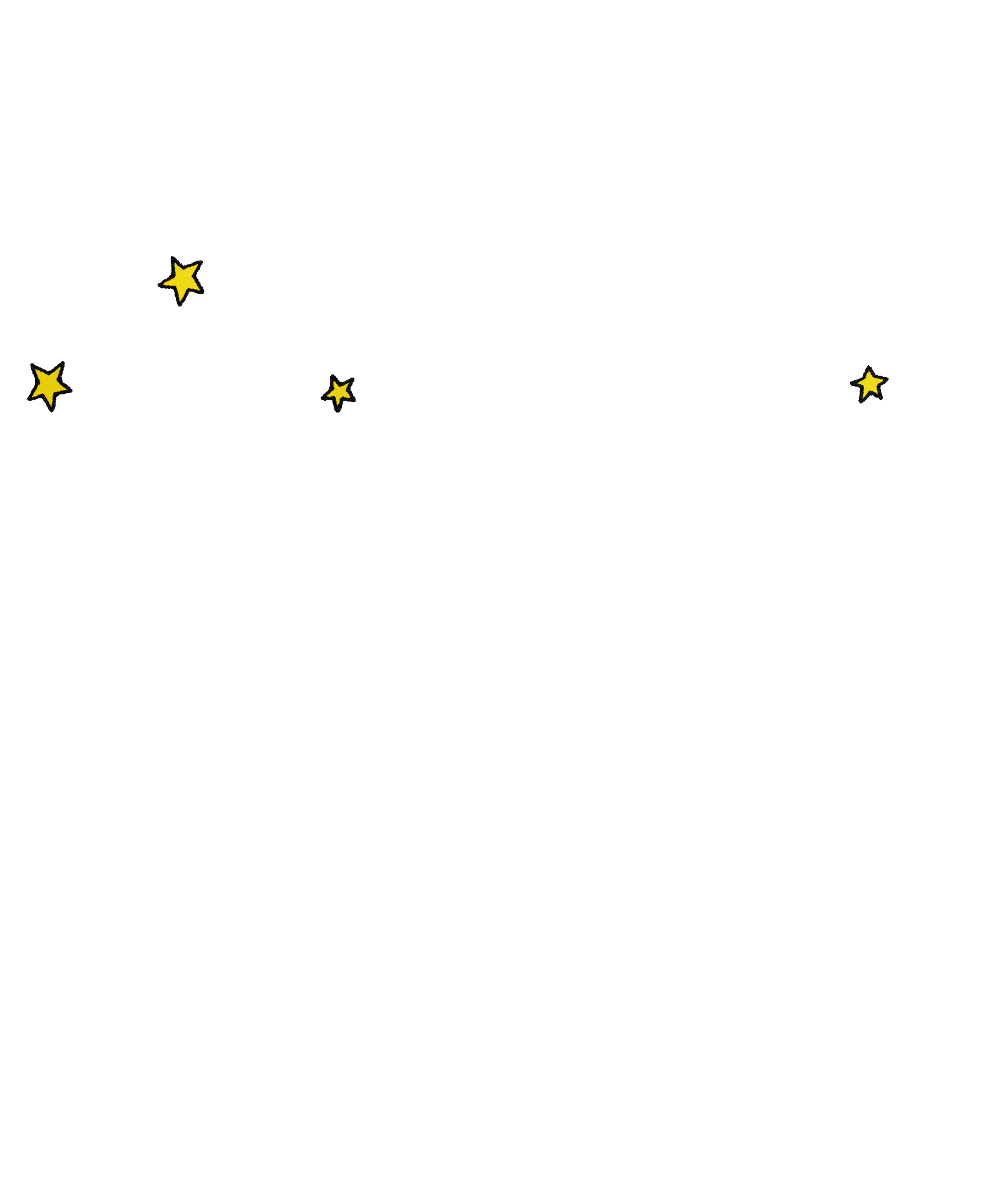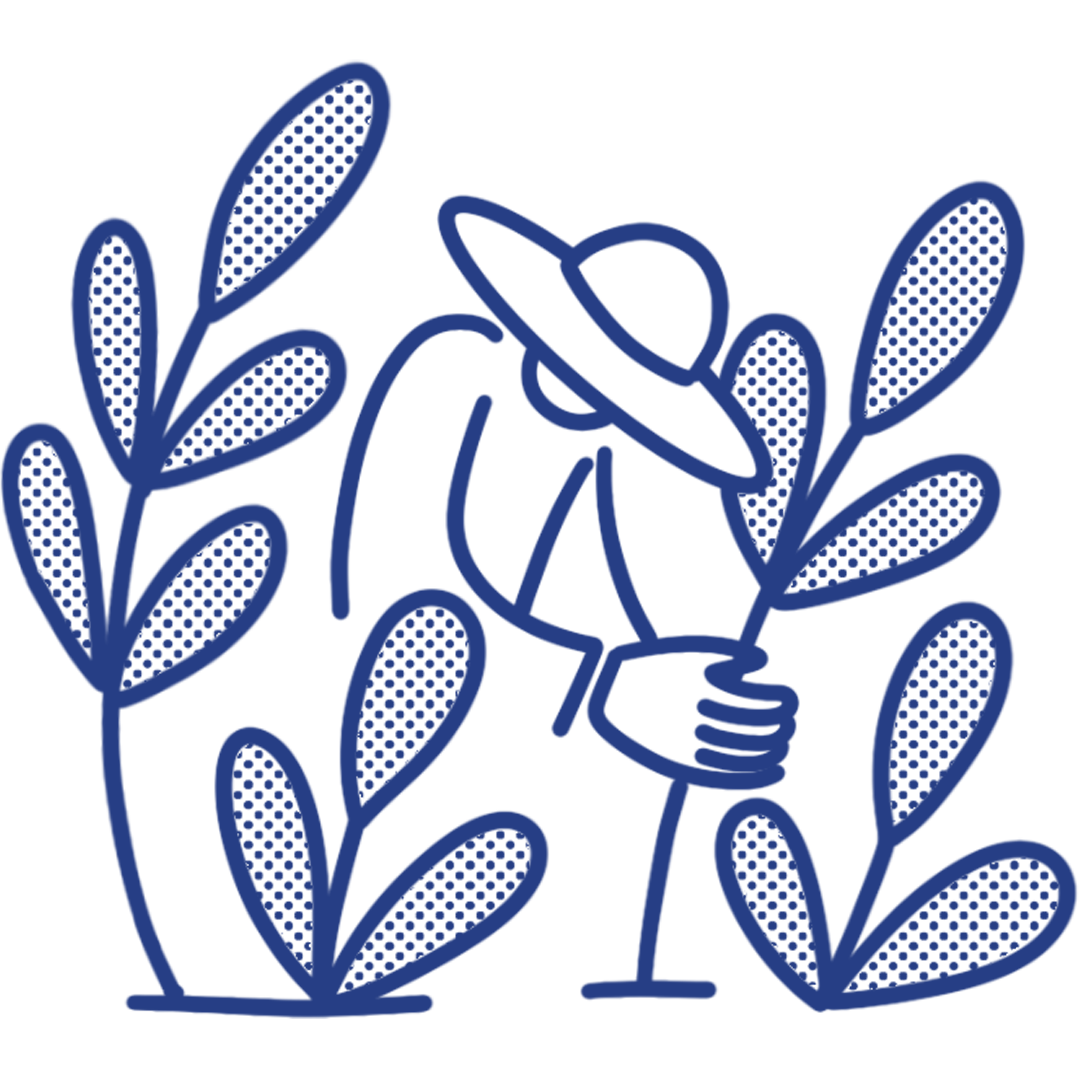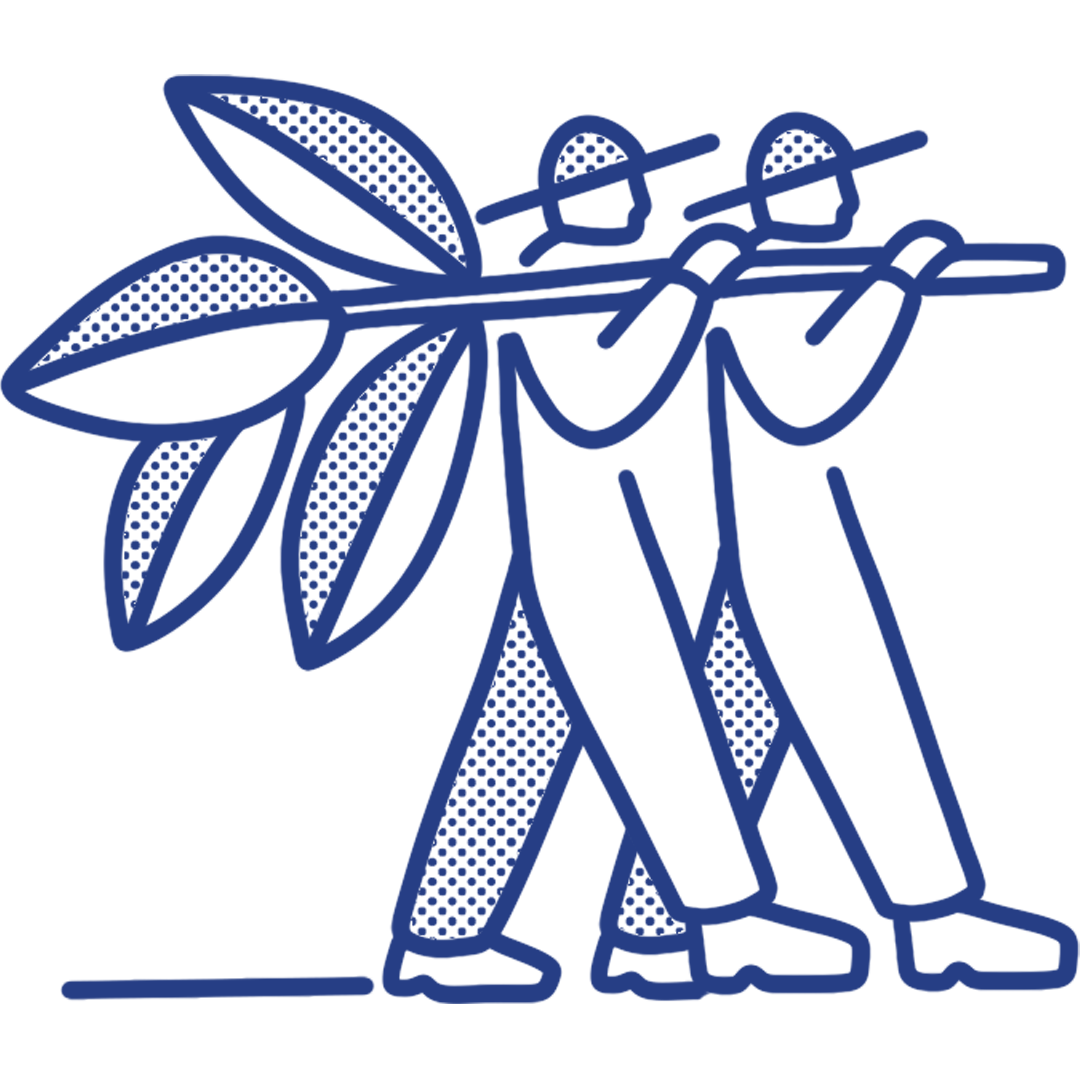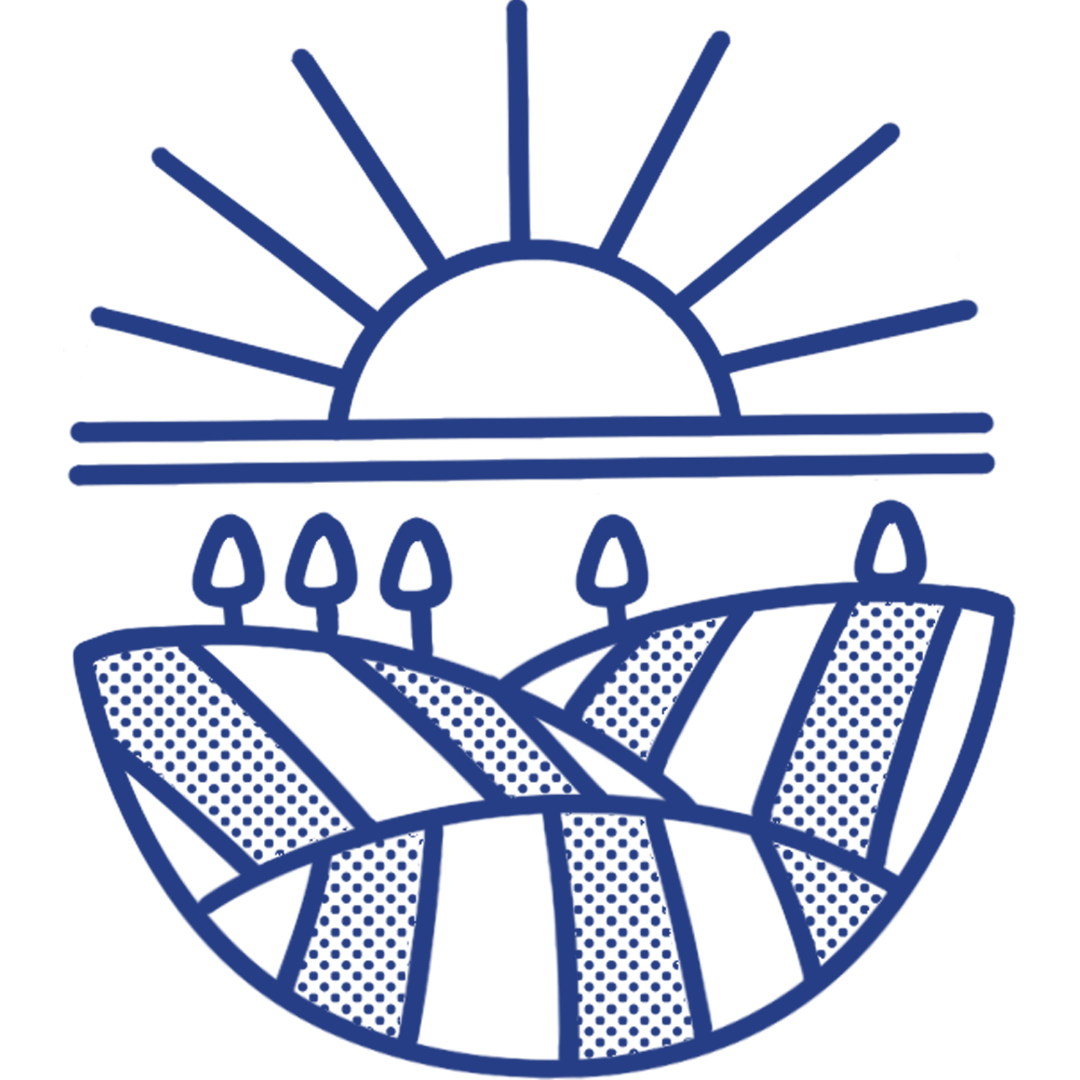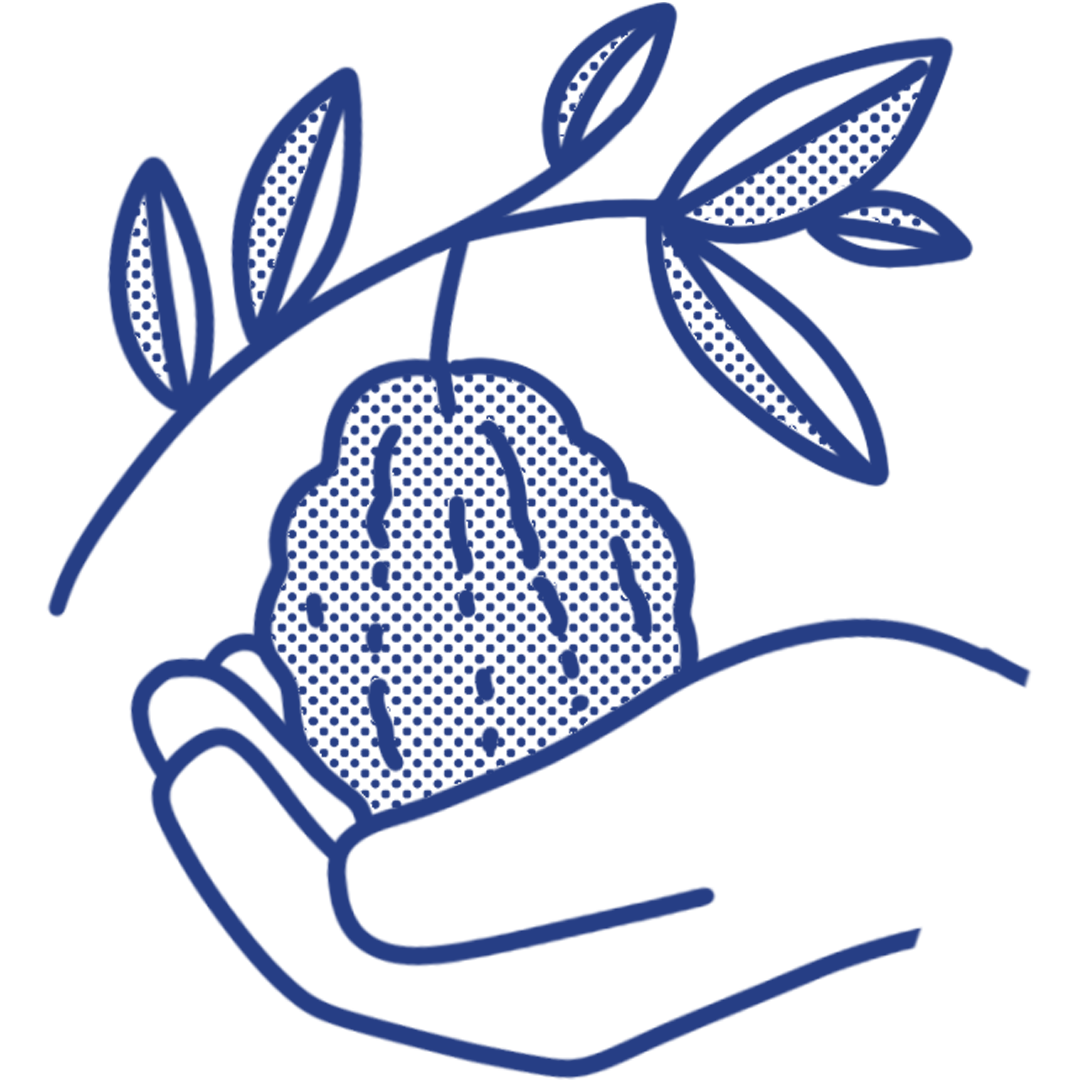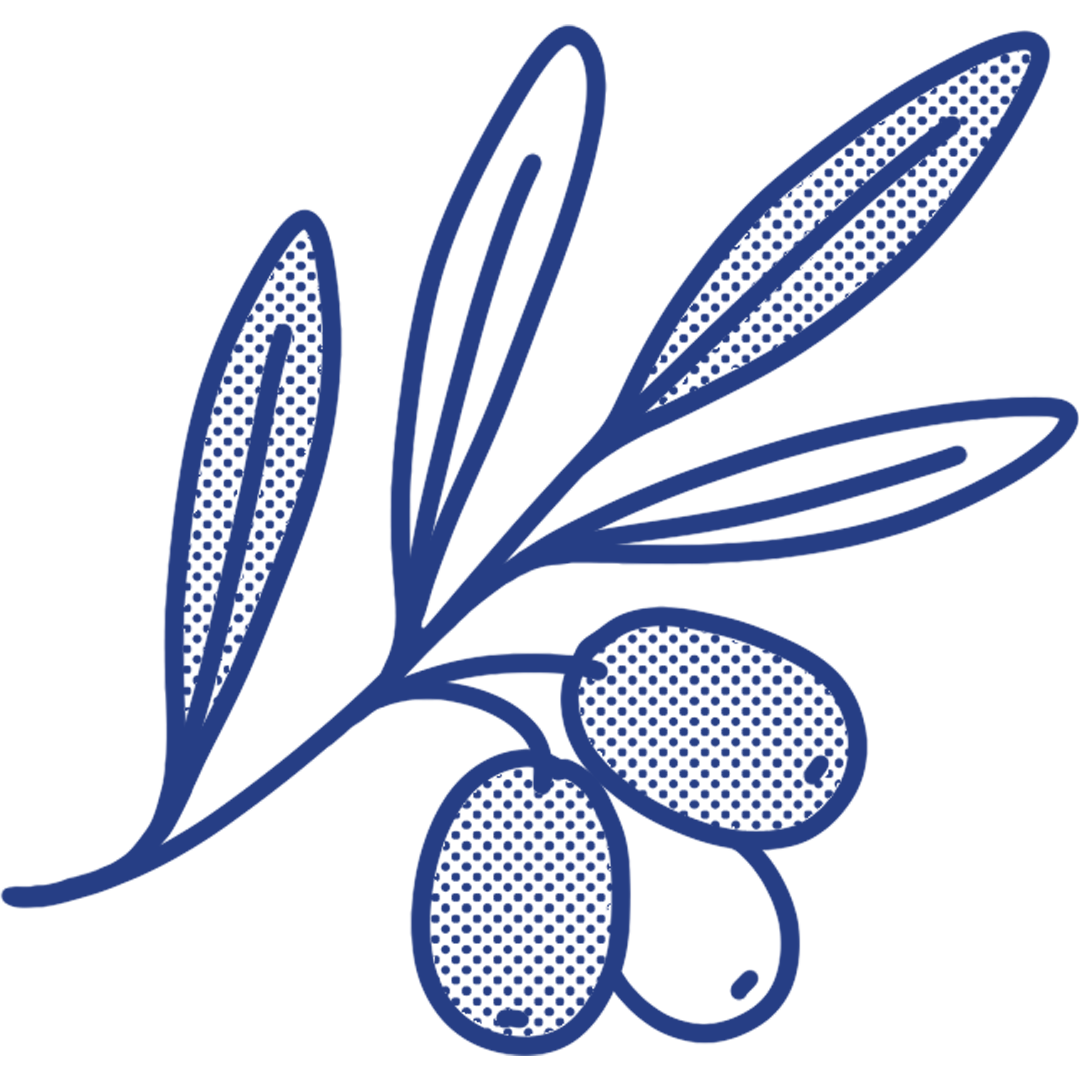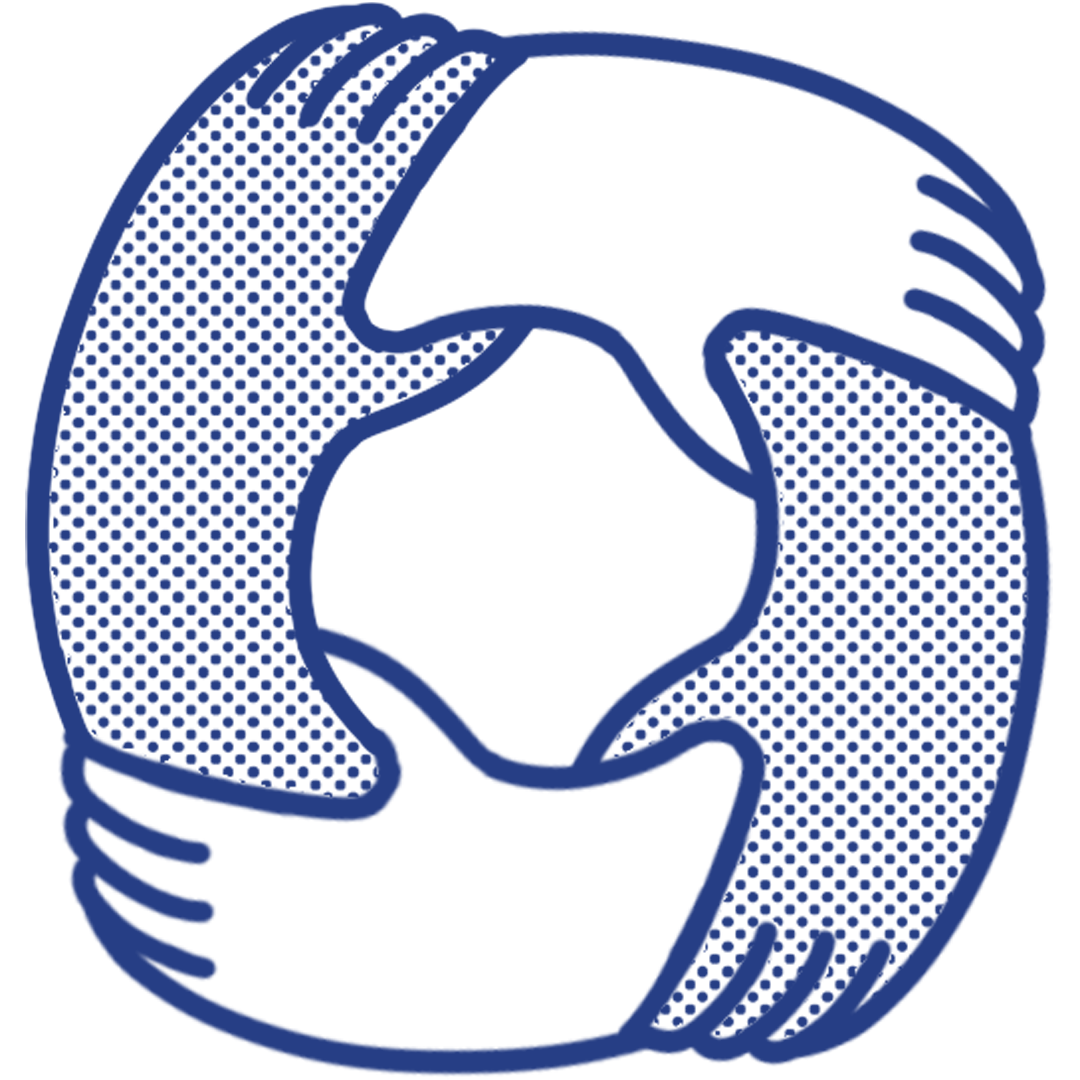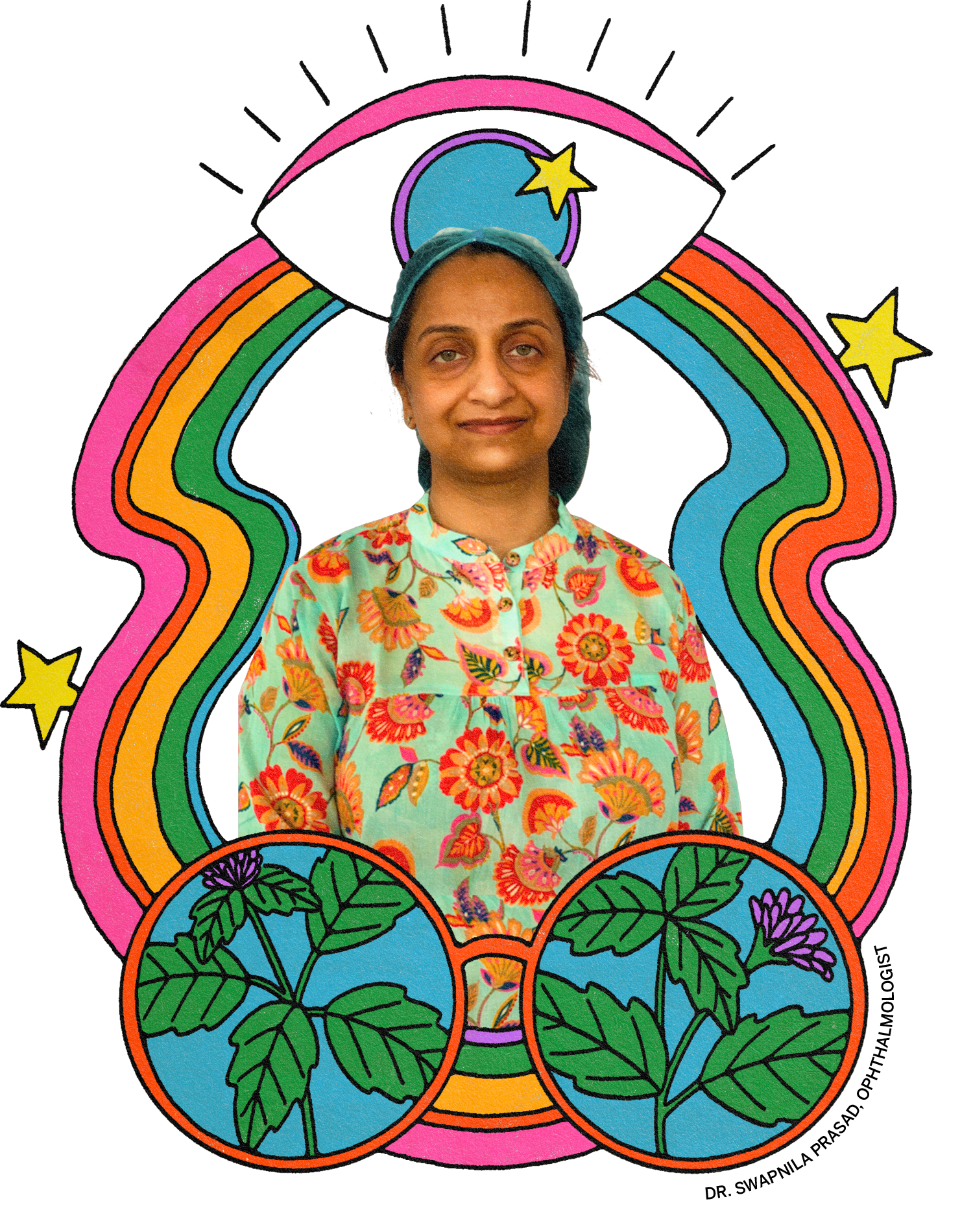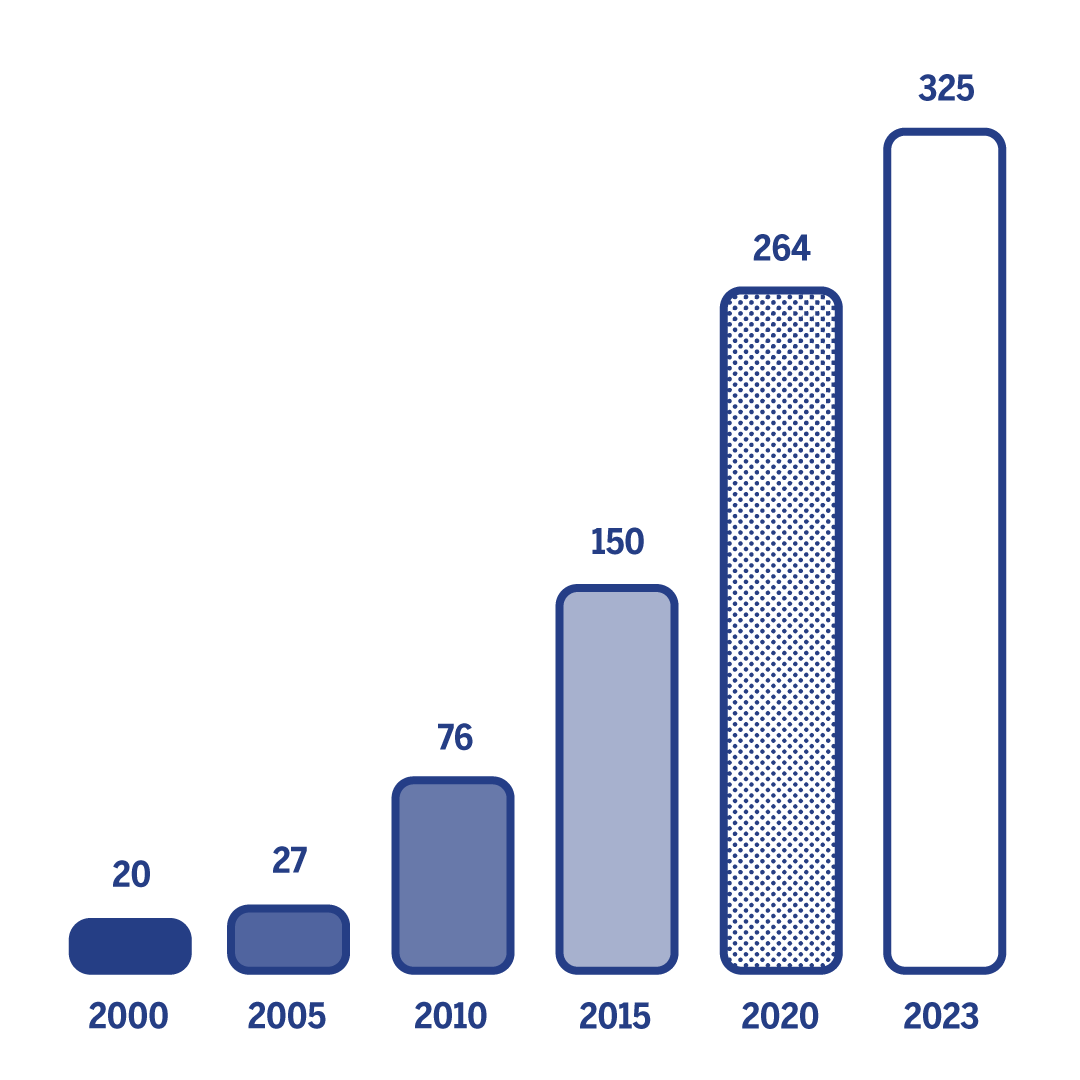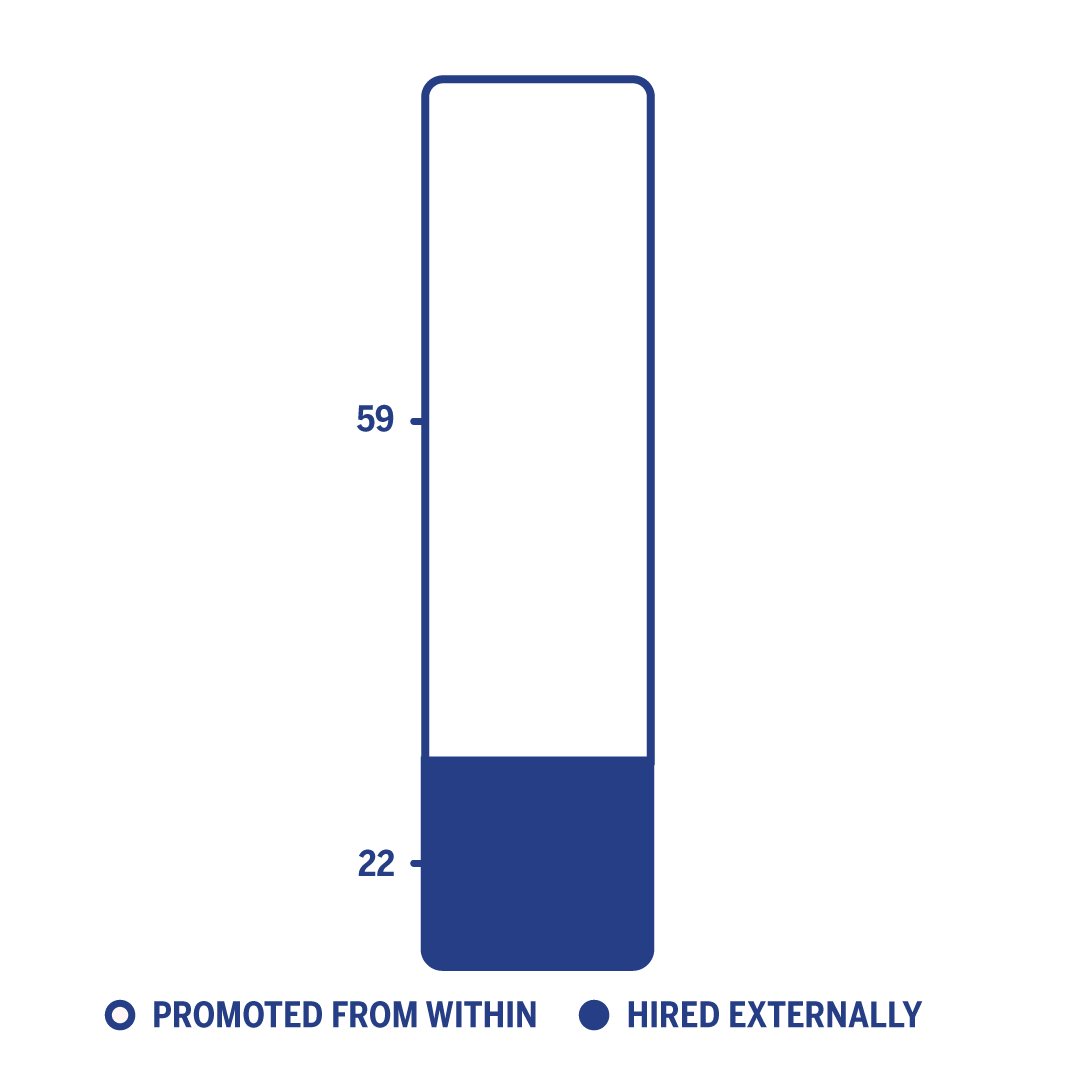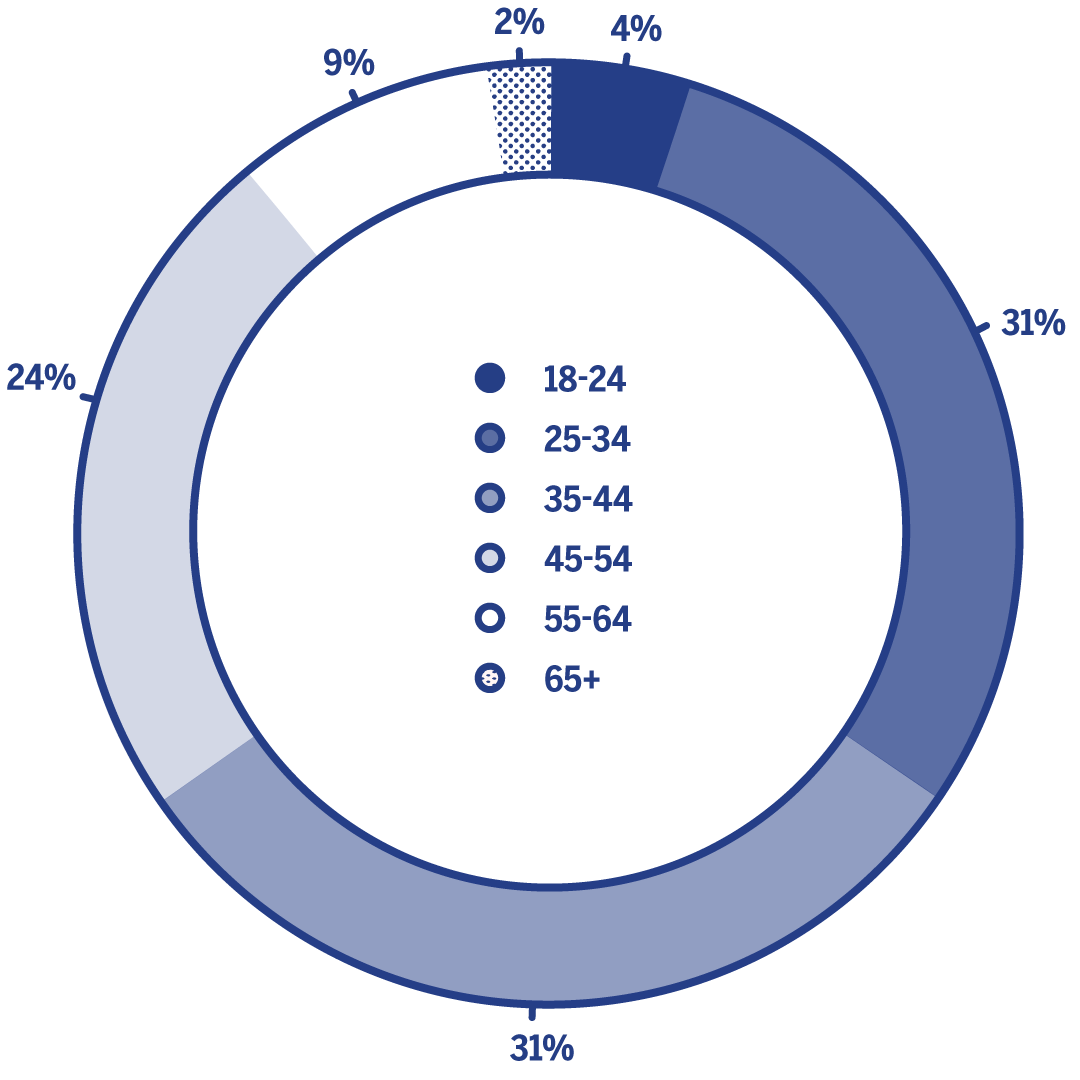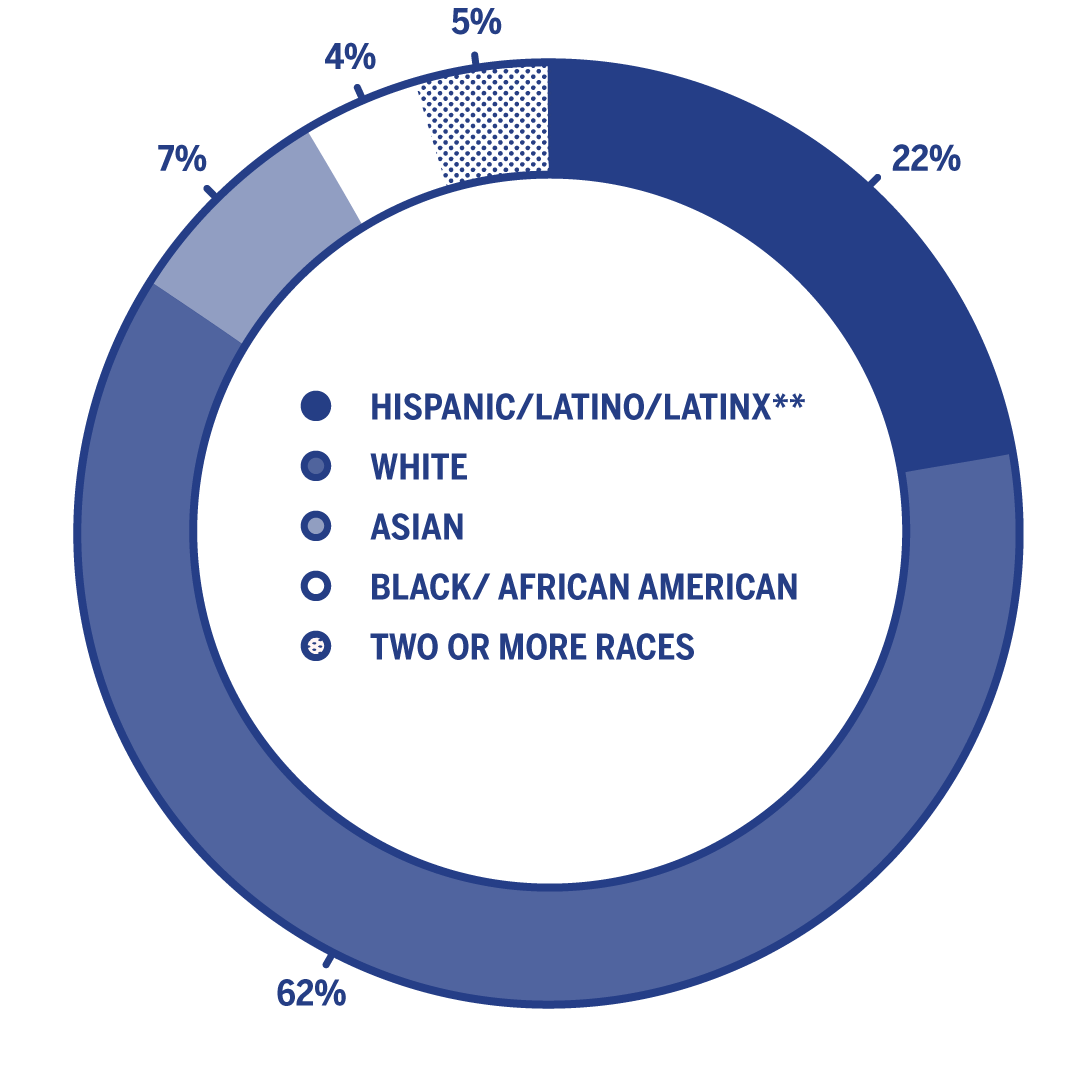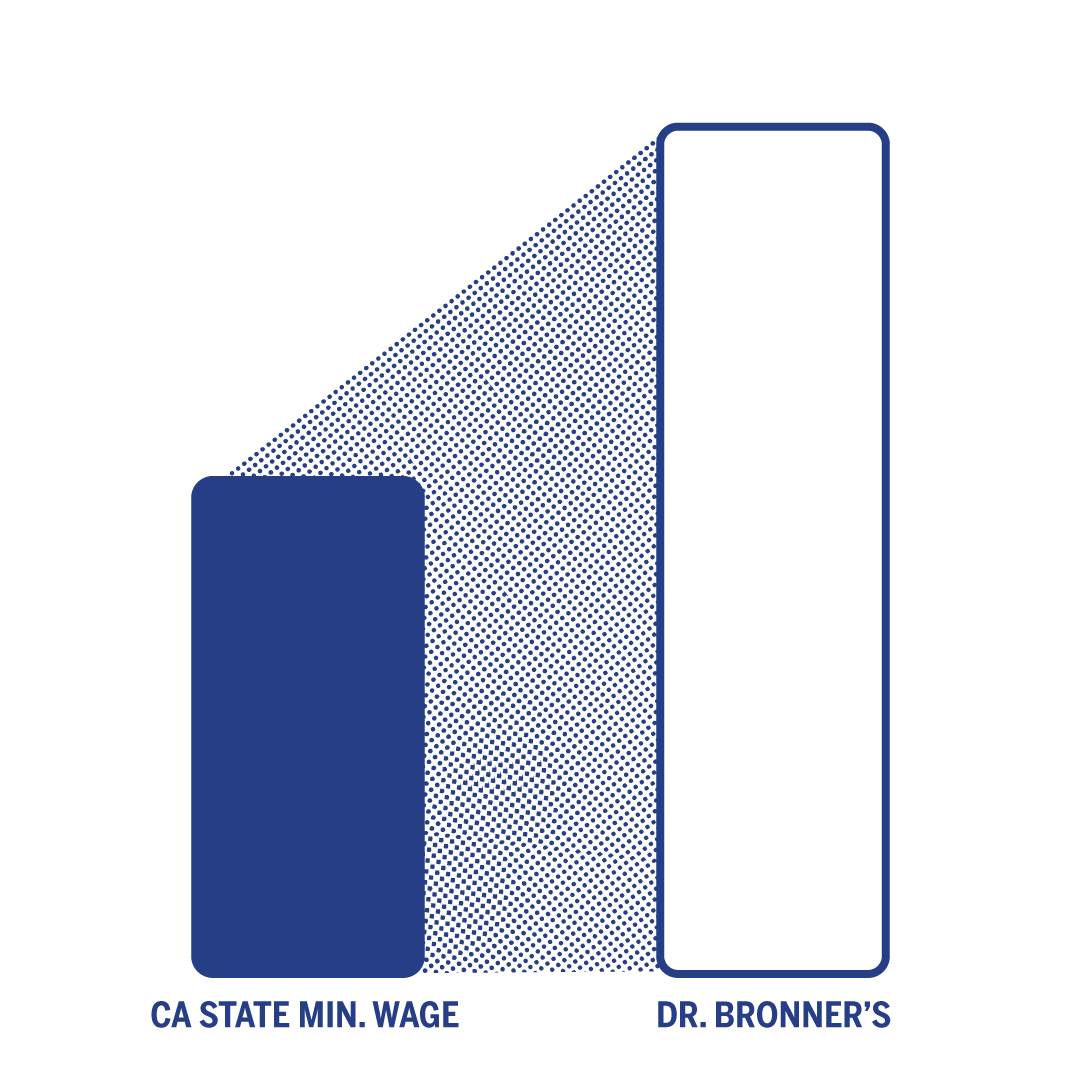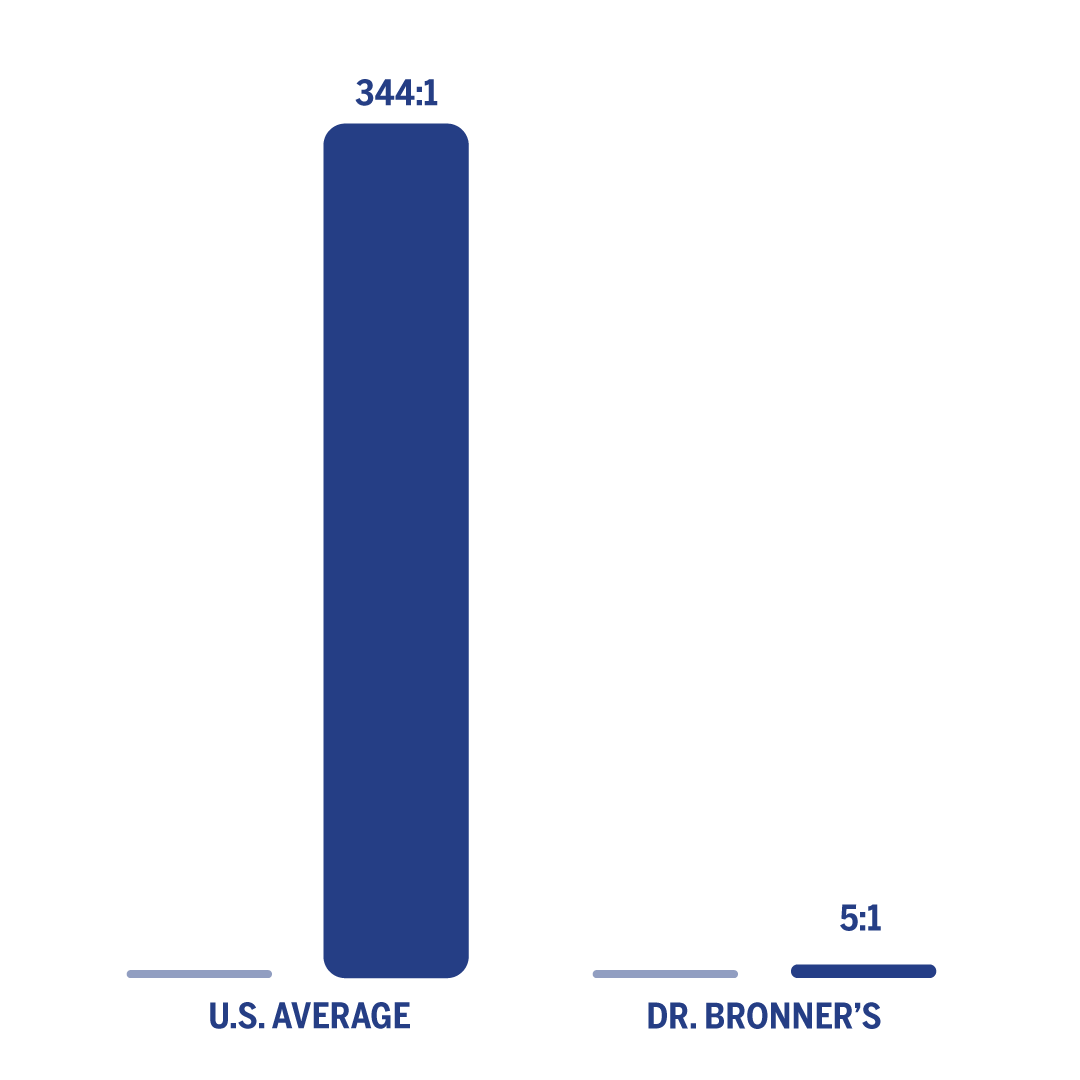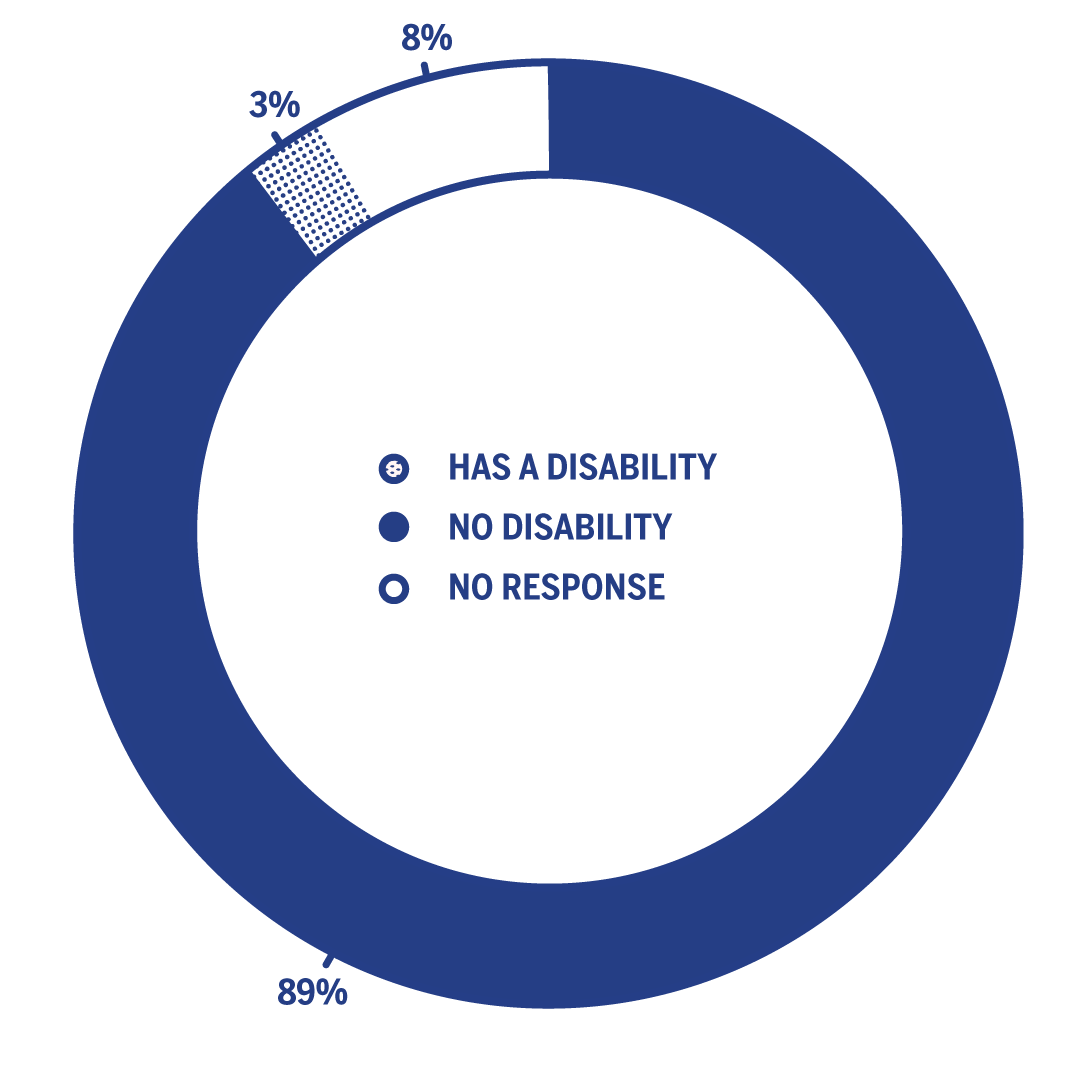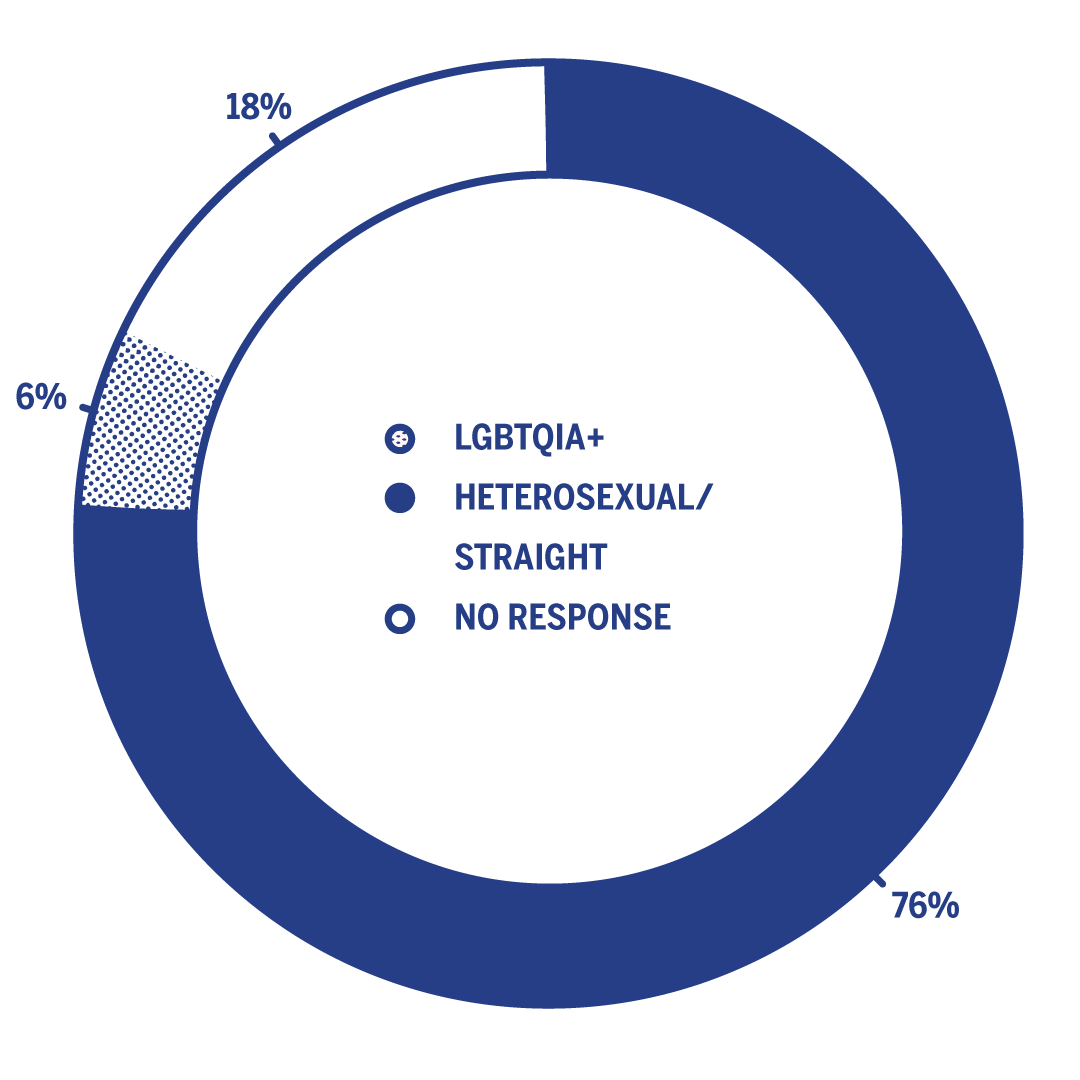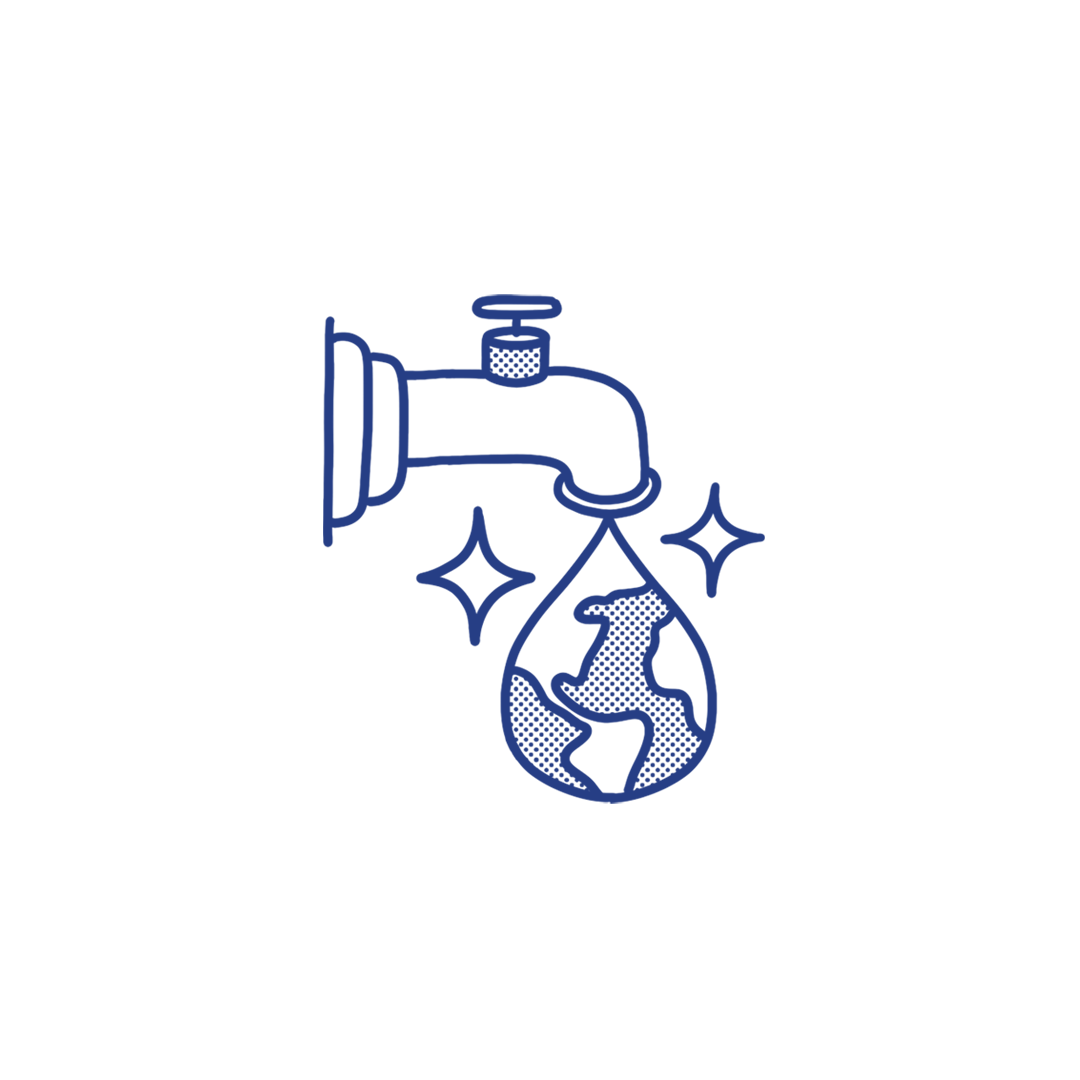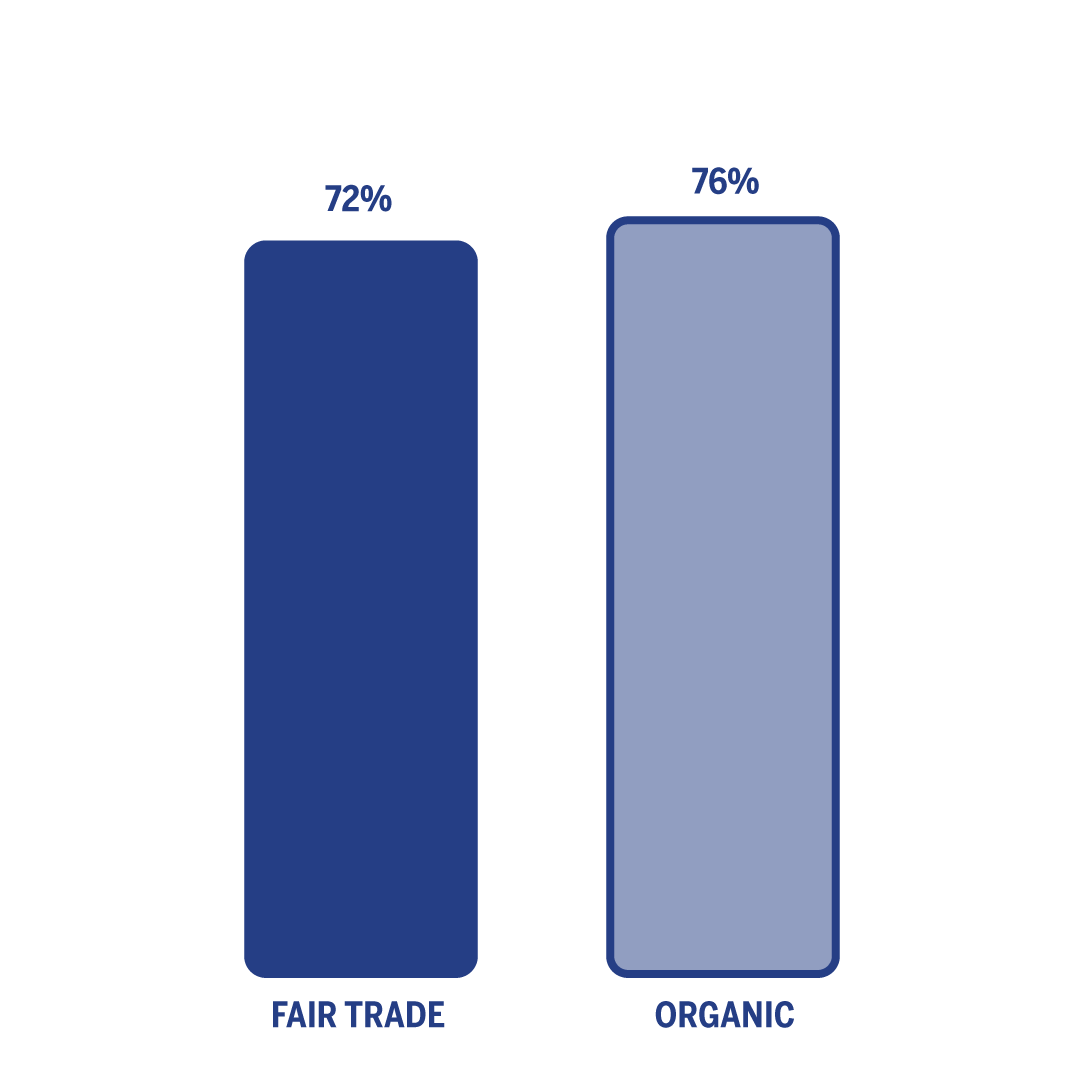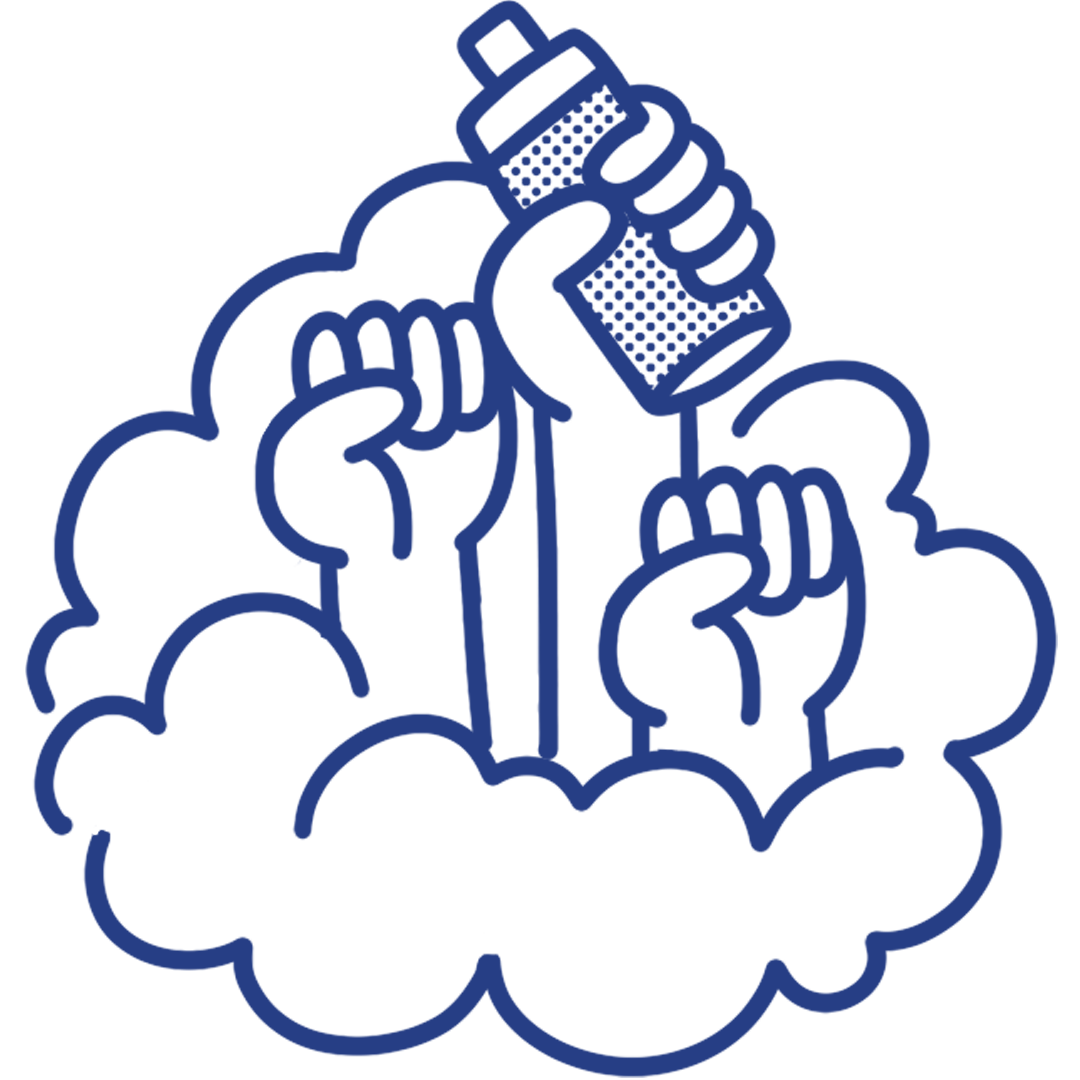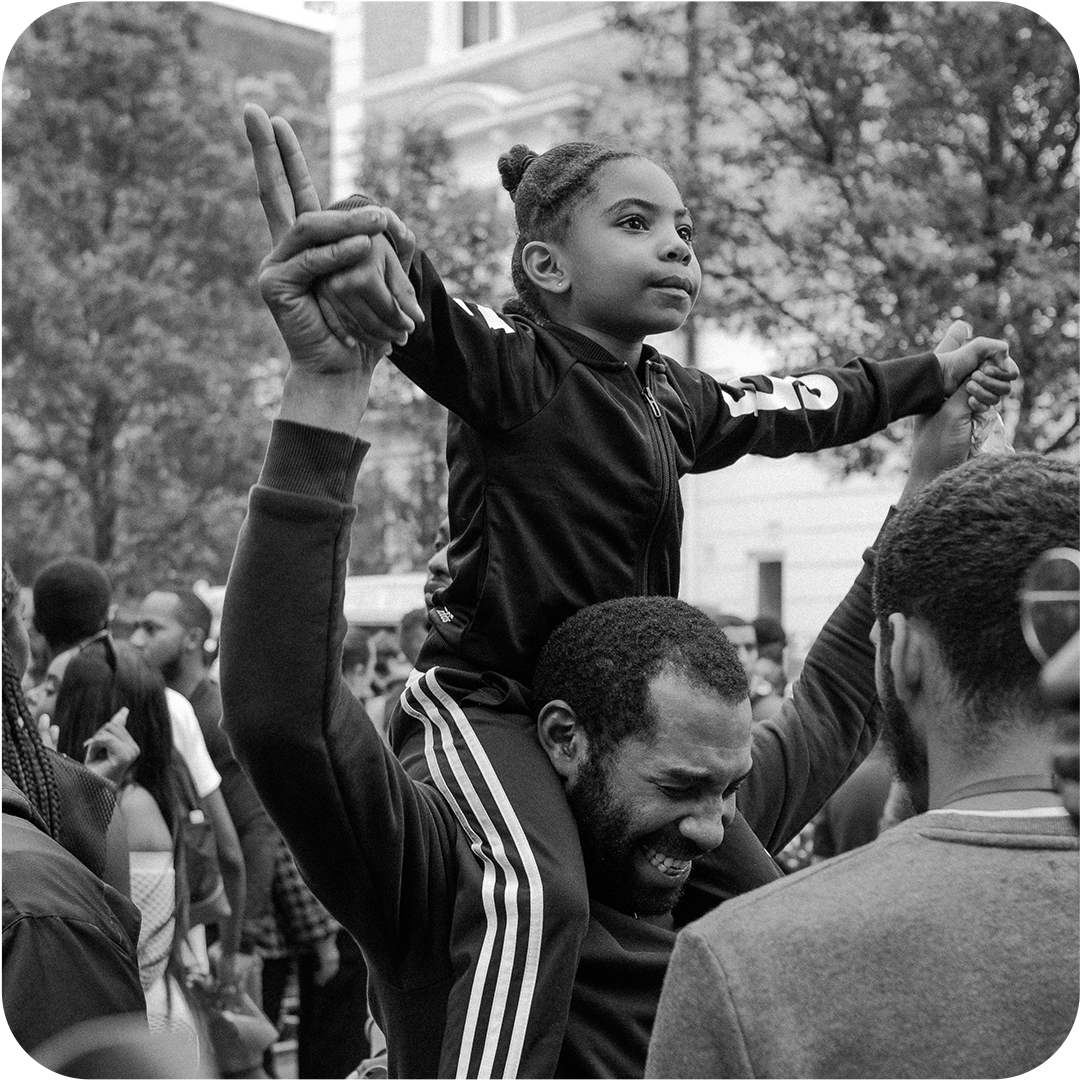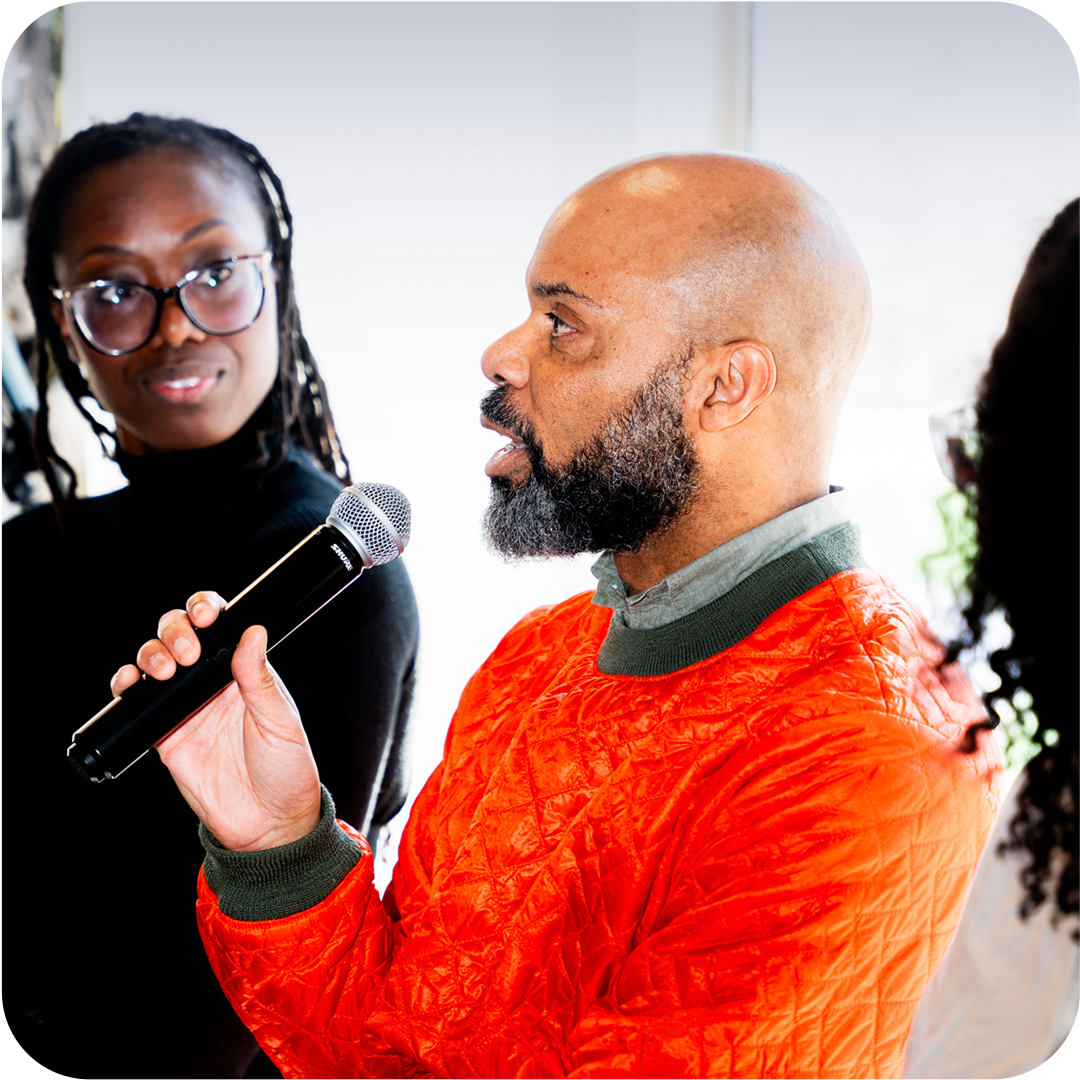Keeping it Real
Mission-Driven Means Community‑Minded
These days, more and more companies say they are mission-driven. Massive multinational corporations make this claim now too, even though they’re still structured to extract profit at all costs. We know saying we are mission-driven isn’t enough. It depends on what that mission is.
At Dr. Bronner’s our mission is community. Our greatest work is to bring people together for the greater good. It isn’t a marketing shtick. It’s in our DNA and it’s our business model. Everything we do is guided by our core values, as outlined in our Cosmic Principles.
These principles represent six interconnected spheres of influence: our business, our customers, our employees, our suppliers, our Earth, and our broader community. We are committed to the collective health of each one.
In this All-One Report we reflect on our impact on each of these areas in 2023. Our report is designed to show what we mean when we say we are a mission-driven company. At our best, we honor our Cosmic Principles by ensuring a holistic and interconnected approach in all we do.
-
Last year we celebrated our 75th year in business.
We’ve come a long way in that time. We’ve grown in annual revenue and in size, to over 300 employees. Last year, we hit the $100 million USD mark in funds donated to charitable and activist causes throughout our history and we launched new packaging to reflect our commitment to reducing our environmental footprint. Our global supply chain now positively and directly impacts an estimated 35,000 people in communities in Palestine, Ghana, Sri Lanka, India, and beyond.
The seed our grandfather planted in 1948 and nurtured until just before the turn of the century has blossomed into something bigger than any of us expected. We are so proud of this company and all it has accomplished.
Society has also come far in the last three quarters of a century. Social movements for civil and human rights and ecological sustainability have helped inch our world closer to the “All-One” world our grandfather dedicated his company and his life to. Yet, we still have a long way to go.
The world is continuing to recover from the Covid-19 pandemic while climate change remains among the biggest threats to the future of life on Earth. An ailing and imbalanced economy that prioritizes the few at the expense of the many causes millions to struggle to meet basic needs. Ongoing wars waged by occupying armies and military superpowers cause mass displacement, suffering, and death throughout Gaza and Ukraine. Racism, sexism, anti-LGBTQ bigotry, antisemitism, Islamophobia, and other supremacist ideologies lock so many into the margins of society and harm the ability of all of us to live our best lives.
Can a soap company change the world? Alone, we can’t. But together with you, we think we can. We seek to fuel and support those who want to make a difference in the world and turn the tide of injustice and suffering. We hope to be a model for a better way to do business and in the process generate and strengthen community.
We have published this impact and sustainability report annually since 2015. We use it to document our journey as a mission-driven business and to help inform where we go from here. Perhaps some of what you learn will inspire your own journey. Your support and your curiosity about how we operate means everything to us.
We are eternally grateful for you. In community, we know we can create a truly “All-One” world.
— David & Michael Bronner
2023 Financial Stewardship
199.6M
-
Raw Materials: $75.8M / 38%
Goods & Services: $46.6M / 23.3%
Wages, Benefits & Profit Sharing: $48.7M / 24.4%
Donations & Sponsorships: $5.7M / 2.8%
Taxes: $8.1M / 4.1%
Depreciation: $2.2M / 1.1%
Interest: $1.8M / 0.9%
Succession Financing: $0.8M / 0.4%
Reinvestment in Company: $10M / 5%
87.8%
12.2%
-
Australia, Austria, Belgium, Canada, China, Cyprus, Czech Republic, Denmark, Estonia, Finland, France, Germany, Greece, Hong Kong, Hungary, Iceland, Indonesia, Ireland, Israel, Italy, Japan, Kenya, Korea, Lithuania, Luxembourg, Malta, Mauritius, Mexico, Netherlands, Norway, Panama, Poland, Portugal, Romania, Singapore, South Africa, Spain, Sweden, Switzerland, Taiwan, Uganda, United Kingdom
The Circle is Unbroken
Cosmic Principle #1—Ourselves
Honoring 5 Generations of Soapmaking Wisdom
When a 910 kilogram giant steel kettle—used by our soapmaking predecessors in Germany over 100 years ago—showed up at our factory floor a couple years ago, it seemed only right to create a small museum to exhibit it at our headquarters. But then the tough questions started: What should this exhibit be about? What parts of Bronner history could we hope to distill into just a few photos and captions? And what did we know about designing museums in the first place?
To back up a bit, the soap kettle was first uncovered by Michael and David Bronner on a trip to Germany in 2010. The brothers had been inspired to connect with the places their soapmaking ancestors had come from—Laupheim and Heilbronn in southwestern Germany.
-
In Heilbronn, the Bronner family (then “Heilbronner”) had established a sizeable factory, that by the 1930s was supplying soaps throughout Germany under the “Madaform” brand. The Nazis seized the business shortly before the outbreak of World War II, eventually sending most of the Heilbronners to concentration camps, where they died.
While visiting the old Heilbronn factory site, Michael and David were invited in by its current occupants, the Frank family—who now use the building to manufacture high-end machine cutting tools. The Franks showed them something astounding: inside there was still one of the Bronner family’s original soap kettles that had been used to manufacture soap!
Fast forward a few years, after being carefully extracted and restored by our partners in Germany, the soap kettle was shipped to our manufacturing plant in Vista, California. Last year, the celebration of our 75th anniversary gave us the nudge we needed to give the soap kettle a proper home.
Walking the factory floor, planning the installation with our facilities and design teams, it hit us: the museum was our opportunity to tell the story of an unbroken dedication—across five generations—to manufacturing the world’s best soap. It was our chance to honor the commitment to quality and craft that began in a small basement of the Heilbronner family home at the center of Laupheim’s Jewish quarter—and continues to this day in our 100% renewably-powered state-of-the-art facility in Southern California. Some of the tools and technology have changed, but our dedication to making pure soap with the best ingredients has never wavered.
2023 Fair Trade & Organic Supply Chain Activity
All Eyes On Palestine
Cosmic Principle #4—Our Suppliers
Supporting our olive oil producers
Dr. Bronner’s commitment to ethical sourcing and fair trade extends beyond paying minimum prices and implementing regenerative organic practices—it means standing in solidarity with our supplier partners, even in the most challenging circumstances. This commitment extends crucially to Palestine’s West Bank, where the farmers who supply 90% of the olive oil for our soaps face extraordinary difficulties.
Nasser Abufarha, founder of our supply partner Canaan Fair Trade, spoke to our staff at the close of 2023 from his home in the West Bank and painted a distressing picture of the conditions there. Nasser detailed how the recent proliferation of Israeli checkpoints, many of them unauthorized roadblocks manned by Israeli settler-reservists, has dramatically altered the landscape of daily commuting for Palestinians. What were once short trips within the West Bank have turned into lengthy, unpredictable journeys. Because of these checkpoints, our olive farmers not only face challenges reaching their orchards or bringing produce to the mill—but often endure harassment and humiliation in the process.
-
Nasser also highlighted the aggressive tactics of extremist Israeli settlers, who frequently intimidate and physically assault Palestinian herders, pushing them off their lands and stealing their livestock. Palestinians’ efforts to obtain justice are met with an opaque and labyrinthine system that is designed to grind them down. Nasser’s account is echoed in a recent article in The New York Times on May 16, 2024 that details how two separate and unequal systems of justice have allowed Israeli settlers to commit crimes with impunity. The tacit support that settlers receive from the Israeli government—and lack of justice for Palestinians who've been harmed—not only erodes any trust that Palestinians have in political solutions, but also eats away at the legitimacy of Israel’s democracy.
While the world’s gaze is justifiably on the brutal war in Gaza and the intense suffering of its civilians, we must also bear witness to the way increased settler violence and harassment in the West Bank have led to economic hardship, demoralization, and disenfranchisement for Palestinians there.
Prioritizing Farmworker Health
Cosmic Principle #4—Our Suppliers
Mobile Camps Offer Life-Changing Care for Our Mint Farmers in India
In the rural regions of Uttar Pradesh, India, where our mint oil supplier Pavitramenthe is based, farmers enjoy little to no health care. Long distances from well-equipped health facilities, lack of specialized medical services, and widespread health-related taboos hurt their quality of life. Working together with Pavitramenthe, our Special Operations team launched a transformative initiative in 2016 to address these issues, initiating and deploying medical camps that deliver essential healthcare directly to these communities.
A main focus of the camps is vision health. Eye diseases are common among rural farmers because of their prolonged exposure to sunlight and lack of adequate eye protection. Smoke from open cooking stoves, dust from fields, and nutritional deficiencies all exacerbate the issue. Our health camps collaborate with Dr. Swapnila Prasad and her highly regarded eye clinic in Bareilly, the nearest large city. She and her team bring expertise and advanced medical equipment to the camps that would otherwise be inaccessible in these villages.
-
At the health camps Dr. Prasad and her team conduct eye exams for hundreds of people and provide them with prescriptions for glasses and medication—which the attendees can then pick up for free right at the camp. Pavitramenthe funds the entire cost through a combination of fair trade funds (paid for by Dr. Bronner's and our customers) and nonprofit grants. Dr. Prasad also identifies patients who are virtually blind from advanced cataracts and recommends them for cataract surgery. These patients are later provided with transportation to Bareilly for the surgery—at just $150 USD per surgery, this modest investment can be life-changing for its beneficiaries.
Jagdish, one of the first patients treated at the camps, underwent cataract surgery on both eyes. Before the surgery, his deteriorating eyesight led to increasing darkness and dizziness, forcing him to withdraw from work and social life. The successful surgery restored his vision, allowing him to resume his former activities—he is even riding his motorcycle again! Another patient, Veravati, was suffering from severe cataracts and pain, but was initially hesitant about surgery as she had never been to a hospital. After deciding to undergo the procedure, the successful outcome of her first surgery encouraged her to then seek treatment for her other eye.
The profound impact of these medical camps is evident not just in the services provided but also in their sustainable approach to healthcare. Since 2016, we've held 22 medical camps that have served nearly 16,000 people. With an average cost of less than $8 USD per participant that includes treatment and medication, the initiative shows how targeted investments in mobile, competent care can lead to significant health improvements.
2023 Employee Statistics
*Based on the EEO-1 form, data collection mandated by the Equal Employment Opportunity Commission from all employers with more than 100 employees.
**Non-EEO-1 term
†Dr. Bronner's is committed to implementing progressive best practices related to fostering social justice, diversity, equity, and inclusion in our company.
In April 2024, we invited our employees to take an anonymous and voluntary survey to share about how they identify. This survey gives us a window into relevant data that helps us better support and understand our employees for the purpose of furthering our Diversity, Equity and Inclusion efforts. The data collected is from a sample of 49% of our total employee population (170 participants out of 347 employees total).
While this data provides more information about our employee population, we also seek to honor and recognize an employee’s choice to opt out of sharing information around aspects of their identity. As such, we did not have a 100% participation rate in our recent survey. In future reports, our goal is to encourage more participation so that we can provide further insights that inform how our company operates and relates to one another.
Shelter from the Storm
Cosmic Principle #6—Our Community
Hope and Housing for Refugees
Dr. Bronner’s connection with Pastor Johny began a few years ago when a surge of Haitian refugees and migrants crossed the Rio Grande. Seeking to understand the unfolding humanitarian crisis, our Director of Engagement Bertine Kabellis—herself Haitian-American—connected company leadership to Pastor Johny, a Haitian refugee who agreed to speak to our staff and tell us his story.
Pastor Johny told us about his own harrowing migration from Haiti. He spoke movingly about the deep despair and anxiety he experienced—being separated from his wife and children for many years, not knowing if he would be granted asylum. His resilience was inspiring—he was eventually reunited with his family and has since become a cornerstone of hope and support for Haitian refugees navigating life in San Diego. His profound empathy, shaped by his own arduous journey, drives his commitment to aid other people.
-
Operating out of the only Haitian church in San Diego County, Pastor Johny had transformed a dilapidated two-room house on the church property into a refuge for about sixty people. Despite the cramped conditions, the shelter provided much-needed security and community for its residents. When a city inspection uncovered some health violations last year, the shelter had to temporarily shutter. Recognizing the need for urgent help, Dr. Bronner's wanted to do what we could to help. Two of our staff members, Chris “Tank” Mayeux and Roberto Alvarez, both skilled contractors, volunteered their services and the company donated $30,000 USD towards materials for necessary renovations.
The renovation team worked miracles on a tight budget. They completely gutted and redid the kitchen and bathrooms and installed hot water facilities. These efforts significantly improved living conditions, making the shelter safer and more comfortable for its occupants. With the renovations complete, the community is once again using it as a home while they await their immigration hearings, a process that can take years. Pastor Johny is able to use the space as a launchpad for his tireless efforts to aid Haitians who arrive here with nothing.
Being community-minded means something deeper than simply giving money to nonprofits—though that’s certainly a big part of what we do. It means connecting person to person. It started when Bertine connected with Pastor Johny. Pastor Johny showed up and connected with our employees when he gave his presentation—and our employees then connected with Haitian migrants in San Diego to provide much needed shelter and support. These lines of connection, the constant flow of ideas-solutions-resources-hope, demonstrates what real community work is made of.
2023 Environmental Footprint
†Scope 1: Direct Emissions are those from sources we directly own or control (e.g., our vehicles).
Scope 2: Energy Indirect, Market-based or Location-based Approach Emissions are from the electricity used at our factory. We report both market-based and location-based figures following the GHG Protocol. Location-based emissions reflect the non-renewable electricity we used from the local grid. Market-based emissions reflect the renewable energy cetificates (RECs) that Dr. Bronner's purchases from Midwestern pollinator-friendly solar projects through our partnership with Organic Valley and OneEnergy, as well as from renewable energy programs that will bring energy independence, resilience, and reduced energy costs to tribal nations in the Pacific Northwest.
Scope 3: Other Indirect Emissions are from our activities related to sources outside of our direct control (e.g., supply chain emissions, shipping, travel).
Listening to Innovate
Cosmic Principle #2—Our Customers
Our Customers Push us to Improve
When Emanuel Bronner ran the company, he famously listed his phone number right on the soap label. He was eager to speak to anyone who called—usually at length—about the Moral ABC. We have tried to keep that direct connection with our customers going throughout our 75 years—a conversation that started over Emanuel's red phone and continues today over customer service calls and the comments sections of our blogs and socials. Thankfully, our customers have a lot to say!
It was our customers’ feedback that we needed to address and reduce our plastic use which pushed us to create our Soap Refill Cartons. We knew they were right—our quest to make the most sustainable soap would not be achieved if we did not lower the environmental footprint of its packaging. Extensive research into alternative packaging for our liquid soap showed that mostly-paper cartons would have the smallest environmental impact—even lower than our current post-consumer recycled (PCR) plastic bottles. So, we launched our new Soap Refill Cartons in a pilot at a few select retailers in 2023.
-
The cartons allow consumers to refill an old Dr. Bronner’s bottle or other container, cutting back on single-use plastic packaging. While this is a change from the way consumers are used to buying and using soap, our customers once again gave us crucial feedback: they love the new Refill Cartons! During our 2023 pilot, we sold over 200,000 cartons. Each refill carton uses 82% less plastic than the equivalent plastic bottle, so the pilot represented a reduction of about 27,500 pounds of plastic! Due to this early success, we've now made the cartons available nationwide at retailers like Whole Foods and Target.
We also continued to pilot and refine our truly circular Soap Refill Stations at several Southern California retail locations in 2023. We gained valuable insights from the pilot and adjusted the design of the refill stations to accommodate different store layouts and ensure ease of use. The refill stations allow consumers to refill their own bottles and buy less single-use packaging, while also allowing grocers to refill on the back end, eliminating single-use from the system entirely. Encouraged by our pilot’s success we are expanding our bulk refill program in California in 2024! We are grateful to our retail partners and our customers, and we look forward to continuing the journey with them towards a circular economy.
Transform the Monocrop Norm
Cosmic Principle #5—Our Earth
Scaling Up Adoption of Dynamic Agroforestry
As an antidote to ongoing tropical deforestation, climate change disasters, and worldwide depletion of soils by chemical-intensive monocrop farming, "Dynamic Agroforestry (DAF)” has a magical ring to it. When we learned about its potential to revolutionize the way we grow our ingredients like palm, coconut, and cocoa—we were immediately sold. But convincing us was the easy part. For Dynamic Agroforestry to have a meaningful impact on the interlinking problems of climate, deforestation, and synthetic fertilization, farmers all around the world will have to be convinced to adopt it. As we've seen firsthand, that is the hard part.
To begin with, Dynamic Agroforestry is a knowledge-intensive form of farming. It requires farmers to plant several different crops in a carefully arranged matrix, so that different species can support each other with beneficial nutrients and shade. This means farmers have to absorb a whole new way of planting and growing. Dynamic Agroforestry also requires continuous maintenance. Trees have to be carefully pruned so the right balance of direct sunlight and shade is achieved, and each crop receives the ideal amount of light. But probably the most challenging barrier to adoption is that Dynamic Agroforestry requires a long-term commitment. It will take most farmers about four years to start seeing the benefits of the system. As humans we’re hardwired to prioritize short term gains, and especially when you're talking about someone's main source of livelihood, getting them to commit to a four-year project is a tough sell.
-
But with a committed approach farmers can be convinced to switch from monocrops to DAF, and we're beginning to see the fruits of our investment. At Serendipalm—our supplier project in Ghana—we operate multiple initiatives specifically to address the issue of DAF adoption. Our team at Serendipalm bought its own plot of land so that they could demonstrate the system and its effectiveness. Serendipalm also began offering training to farmers in planning and maintaining their DAF fields. In short, we offer subsidies and assistance to help farmers make the leap.
The result? Ninety percent of the farmers we interviewed last year said that they are willing to continue with DAF management, even once they will be paying for it themselves! Farmers like James Akwetey Dapaah and Kofi Boateng, who were among our early adopters, are so convinced of the benefits—benefits that include reduction in pests and diseases, and increased resilience in the face of droughts—that they have begun expanding DAF practices into more and more of their fields and are even talking to their friends and family about the advantages of DAF.
The impacts of these changes are not theoretical. Through new calculation tools that we have adopted to track how much carbon we are sequestering through our Dynamic Agroforestry practices, we calculate that in the next 23 years we will be able to sequester about 90,000 metric tons of carbon dioxide. This is equivalent to taking nearly 20,000 typical passenger vehicles off the road for one year!
2023 U.S. Giving
$5,657,697
Total given to activist and charitable causes
Dr. Bronner’s has always been "the fighting & uniting soap company,” dating back to when Emanuel Bronner called on the human race to unite from street corners and auditoriums, selling his peppermint castile soap on the side. Carrying forward that same activist spirit, it is our mission to continue to use the company to fight for and financially support causes we believe in. The following outlines the amount of money we gave to each cause area we supported in 2023, along with a list of organizations that received a financial contribution.
Dollar values represented in USD.
-
Animal Outlook
Black Vegan Society
Farm Forward
Sea Shepherd Global
Sistah Vegan Project
VINE Sanctuary -
Boys & Girls Clubs of Greater San Diego
Boys to Men
Rajepre
San Diego Children's Discovery Museum
San Pasqual Athletic Boosters -
Alliance San Diego
Building Bridges
Combatants for Peace
Gender Blender
Gender Illumination
Global Giving Foundation
If Not Now
J Street Education Fund
Movement for Black Lives
Rebuilding Alliance
Safe Place International
The Parent's Circle - Families Forum
Together Beyond Words
TRANScend Conference
Veterans for Political Innovation -
Burning Man Project
Cayenne Wellness Center and Children's Foundation
City of Vista Moonlight Amphitheatre
Doorway Into Light
Escondido Rotary Foundation
First Haitian Baptist Church San Diego
Hanahana Beauty Circle of Care
Lived Experiences
Lupus Foundation of America
Luvworx
Maui Mutual Aid
Operation HOPE-North County
QueerDome
Red Lodge Transition Services
Rising Star Program
San Diego Gives
Spearitwurx
Tiognaka Tawowakan Otokahe
Vista Chamber of Commerce
Grassroots Aid Partnership
LifeNabled
Humanity Showers -
Fair Shake
Jail Guitar Doors
Defy Ventures
-
Alma Institute
Awe Foundation
B.More
Brooklyn Psychedelic Society
California Senate Bill 58 to Decriminalize Psychedelics
Chacruna Institute for Psychedelic Plant Medicines
Chapel of Sacred Mirrors
Church of the People for Creator and Mother Earth
Dana-Farber Cancer Institute
Denver Wellness and Discovery Center
Erowid Center
Eugene Center for Ethnobotanical Studies
Fireside Project
Healing Advocacy Fund
Healing Breakthrough
Health Equity Program & International Therapist Education Program
Heffter Research Institute
Heroic Hearts Project
Horizons Center PBC Inc.
Indigenous Medicine Conservation Fund
Indigenous Reciprocity Initiative of the Americas
International Center for Ethnobotanical Education Research & Service
Law Enforcement Action Partnership
Ligare
Maine Psilocybin Health Access Act (LD 1915)
Nierika AC
Of Night and Light Film
Psychedelic Health Equity Initiative
Psychedelic Medicine Coalition
Psychedelic Science Funders Collaborative
Roots to Sky Sanctuary
Sabina Project
Sacred Garden Community Church
Sacred Plant Alliance
Shefa
SNAPLab
Society for Psychedelic Outreach Reform and Education
Students for Sensible Drug Policy
Thank You Life
Veterans Exploring Treatment Solutions
Veterans of War
Zendo Project -
Climate Science Alliance
Escondido Creek Conservancy
Last Beach Cleanup
Les Fruits de Mer
The Tri
U.S. Right to Know
San Diego Food Systems Alliance
Solana Center for Environmental Innovation
Story of Stuff Project
Surfrider Foundation San Diego
Breast Cancer Prevention Partners -
Business for a Fair Minimum Wage
Fair World Project
Land of Canaan Film -
Action for Women
Afghans for a Better Tomorrow
African Communities Together
Afroresistance
AJWS
Alma Migrante
American Friends Services Committee
Asian Solidaity Collective
Black LGBTQIA+ Migrant Project
El Refugio
Espacio Migrante
Freedom for Immigrants
Home Storytellers
Honeypot Productions
Immigrant Defenders Law Center
Inland Coalition for Immigrant Justice
Justice In Motion
Karen organization of San Diego
Kindle Project
Louisiana Organization for Refugees and Immigrants (LORI)
Never Again Action
Pillars of the Community
Refugee Congress
San Diego Refugee Community Coalition
Survivors of Torture International
Tahirih Justice Center
Tennessee Immigrant & Refugee Rights Coalition
The AjA Project
Tipey Joa
United We Dream
United Women of East Africa
Via International
Women Watch Afrika -
Coastal Roots Farm
Indigenous Regeneration
Kiss the Ground
Paul E. Dolan Foundation
Regenerative Organic Alliance
Soul Fire Farm Institute
Sun+Earth Certified
The Ecology Center
Provender Alliance
2023 International Giving
$220,998
Total given to ALL-ONE International Initiative
Over the past twenty years, Dr. Bronner’s has grown an extensive global sales network—we are now sold in over 40 countries! This began when Michael Bronner, president and a grandson of our founder Emanuel Bronner—was inspired by his years spent teaching English in Japan and set out to expand the business into new markets around the world.As a global brand, it is imperative that we model our mission as “the fighting soap company” internationally. To do this, we created an international philanthropy program, ensuring that local mission-aligned advocacy and activism is a major priority for Dr. Bronner’s and our distributors in each of the markets that the company sells our products in outside of the United States. Through the All-One International Initiative, at a minimum, 1% of sales to Dr. Bronner’s participating international markets are donated annually to local efforts in support of social justice, environmental sustainability, and animal advocacy. 2023 marked the 5th year of the initiative!
Dollar values represented in USD.
-
Eat Up (Social Justice)
Edgar's Mission
Seed Indigenous Youth Climate Network (Environment) -
Verein Gegen Tierfabriken (Animal Advocacy)
-
Animal Justice (Animal Advocacy)
Black Lives Matter Canada (Social Justice)
Groundswell Community Justice Trust Fund (Social Justice)
Indigenous Climate Action (Environment)
Regeneration Canada (Environment)
Rivershed Society of BC (Environment) -
Assiettes Végétales (Animal Advocacy)
Notre Affaire à Tous (Environment) -
PROVIEH (Animal Advocacy)
German Association for Agroforestry (Environment) -
VOICE Ireland (Environment)
-
Freedom Farm Sanctuary (Animal Advocacy)
The Arava Institute (Environment) -
Sea Shepherd Italy
-
Homedoor (Social Justice)
Shizen (Environment)
-
The Beautiful Foundation (Social Justice)
Project Moon Bear (Animal Advocacy)
Sihwa Lake Sustainable Partnership (Environmental Sustainability) -
Reinserta (Social Justice)
Sbelal Kuxlejalil (Environmental Sustainability) -
Costa Recicla (Environmental Sustainability)
-
Centre for a Responsible Future (Animal Advocacy)
Kampung Senang (Environmental Sustainability)
Oogachaga (Social Justice) -
Djurens Rätt (Animal Advocacy)
-
Hof Narr (Animal Advocacy)
-
Taiwan Environmental Information Association (Environmental Sustainability)
Taiwan Animal Equality Association (Animal Advocacy) -
Soil Heroes (Environmental Sustainability)
-
Ecohustler (Environmental Sustainability)
Emmaus Brighton & Hove (Social Justice)
City to Sea (Environmental Sustainability)
Surge (Animal Advocacy) -
Sea Shepherd Global* (Animal Advocacy & Environmental Sustainability)
*Funded through US Animal Advocacy budget
2023 Advocacy &
Action Timeline
2023 Mutual Aid
Our Crisis Response Product Donation Program
Dr. Bronner’s Mutual Aid Product Donations began as a our Covid-19 product donation program. Through this effort, we continue to distribute Organic Hand Sanitizer and Pure-Castile Soap and other products to efforts supporting community members in need of hygiene products across the U.S. and in Canada. We donate products to be distributed by a variety of nonprofit and grassroots outreach and direct-service efforts in the form of community pantries and meal programs, hygiene kits, shower trailers, free stores, shelters, and outreach projects, just to name a few.
Mutual aid projects are a powerful example of emergent strategy. They reflect the potential of communities acting reflexively in coming together to address needs in times of crisis. Our donation program was conceived in this same spirit. When activist allies came to us in the beginning of the pandemic sharing their difficulty in securing necessary hygiene supplies for at-risk populations, we felt we had to step up.
We distribute our products to mutual aid groups because it is a concept that aligns deeply with Dr. Bronner’s All-One approach to community building and creating meaningful positive change. Dr. Bronner’s does not require or expect any mutual aid groups to promote or acknowledge our product donations in return for them. It’s been incredibly inspiring to connect with emerging networks across the country and play a small role in helping these projects to meet needs and address root causes.
Mutual Aid is first and foremost about community members voluntarily looking after each other. We are proud to continue this important program that allows our products to bolster the efforts of projects that work directly to meet needs on the ground across the US and beyond.
-
Afghan Coalition - Fremont, CA
Aisle 10 - Portland, OR
Animal Outlook - Marina Del Rey, CA
Ashland Emergency Food Bank - Ashland, OR
Authentic Creations Artistic Apothecary - Albuquerque, NM
Baby 2 Baby - Van Nuys, CA
Back 2 School Fresh! with Redemption Church - Irvine, CA
Bangor Area Homeless Shelter - Bangor, ME
Beyond the Pantry - Tallahassee, FL
Black Lives Matter West Virginia - Morgantown, WV
Black Thistle Street Aid - Eugene, OR
Black Trans Blessing - Bronx, NY
BronxCare Health System - Bronx, NY
City and County of Denver Parks and Recreation Department - Denver, CO
Community Outreach through Radical Empowerment - Eugene OR
Contra Viento y Marea - Ontario, CA
Cooperation Jackson - Jackson, MS
Dave Purchase Project - Tacoma, WA
EKY Mutual Aid - Olive Hill, KY
Equitable Giving Circle - Portland, OR
Family Promise of West Michigan - Grand Rapids, MI
Fannie Lou Hamer Center for Change - Eupora, MS
Farm Forward - Los Angeles, CA
Finder's Collective - Gill, MA
Food Not Bombs Pensacola - Pensacola, FL
Food Not Bombs Tallahassee - Tallahassee, FL
Gowanus Mutual Aid - Brooklyn, NY
Grassroots Artists Movement - Brooklyn, NY
HIV Alliance - Eugene, OR
Jersey City Mutual Aid Society - Jersey City, NJ
Judi's Midnight Diner - Medford, OR
Love Light and Healing Inc. - Dearborn, MI
Maui Mutual Aid - Kahului, HI
Migrant Solidarity Mutual Aid Network - Washington, DC
Miry's List - Sacramento, CA
Mrs. B's Table - Menifee, CA
Mutual Aid Disaster Relief - Tampa, FL
-
Mutual Aid Disaster Relief Cleveland - Cleveland, OH
Narenj Tree Foundation - Bryn Mawr, PA
40+Nederland Food Pantry - Black Hawk, CO
New Hampshire Mutual Aid Relief Fund - Concord, NH
NEXT Distro - New York City, NY
NorCal Resist - Chico, CA
North County Mutual Aid Collective - San Marcos, CA
Northern Valley Harm Reduction Coalition - Chico, CA
Octavia's Options - Rogue River, OR
Oil Change International - Brooklyn, NY
OnPoint NYC Holistic Services - New York, NY
PeaceWorks Inc. - Bailey, CO
Project Hope Alliance - Costa Mesa, CA
Refugee Care Collective - Portland, OR
Rogue Valley Pepper Shakers - Medford, OR
Sacred Liberation - El Paso, TX
Seattle University Student Group - Olympia, WA
Serenity Solidarity - Louisa, VA
Share the Warmth International - Woodland Hills, CA
Shine Foundation - New York City, NY
Solidarity Engineering - Mission, TX
Southern Humboldt Community Healthcare Foundation - Garberville, CA
St. Peter's Episcopal Church Outreach - Huntington, WV
Stabbin Wagon MFR - Medford, OR
Supply Hive - Des Moines, IA
T'ena Health - Los Angeles, CA
The Sidewalk Project - Los Angeles, CA
Threshing Floor, Inc - Long Beach, CA
Tranzmission - Asheville NC
Union County Warming Station - La Grande, OR
University of Northwestern - St. Paul, Nursing Program - Maple Grove MN
Urban Justice Center - New York, NY
Vegans of LA - Los Angeles, CA
Vocal NY - Brooklyn, NY
We Keep Us Safe Collective - Baltimore, MD
West Oakland Mural Project - Oakland, CA
West Valley Mutual Aid LA - Ventura, CA
White Bird Clinic (CAHOOTS) - Eugene, OR
Yummers Pets Pride Month Community Fridge - Temecula, CA
